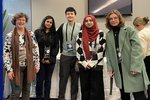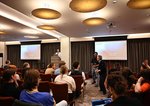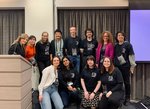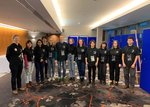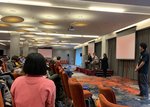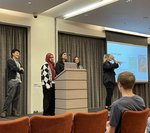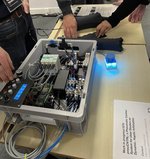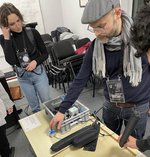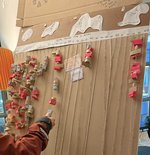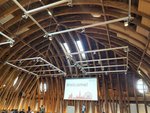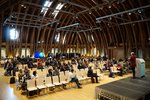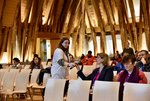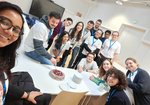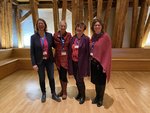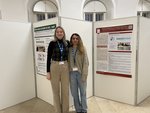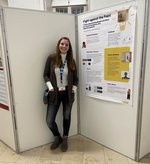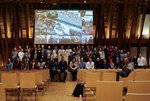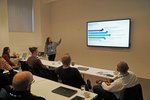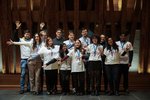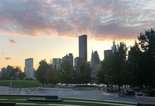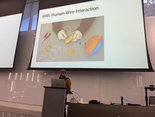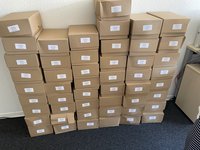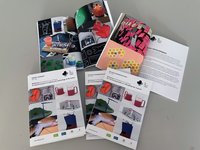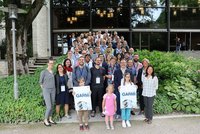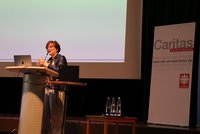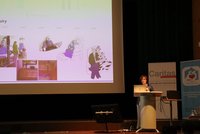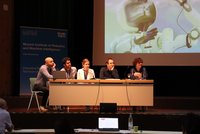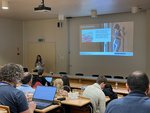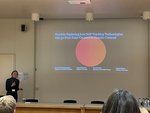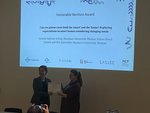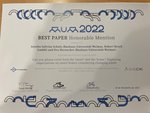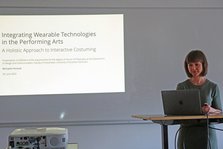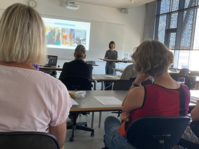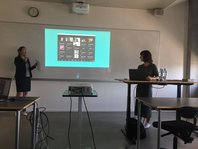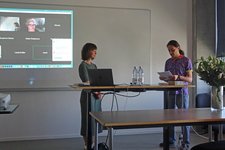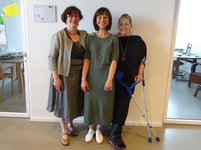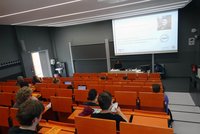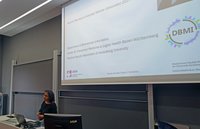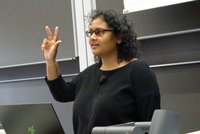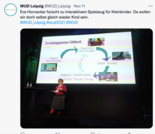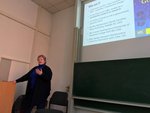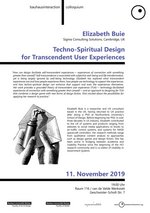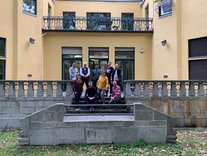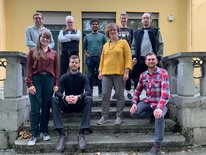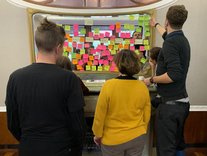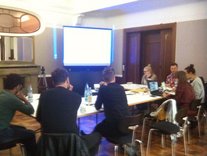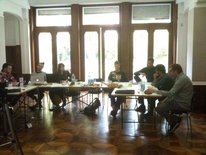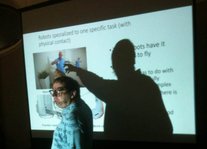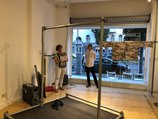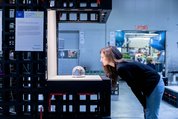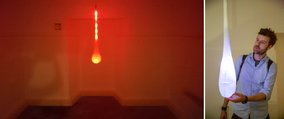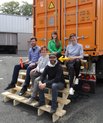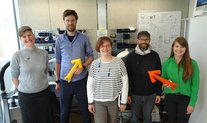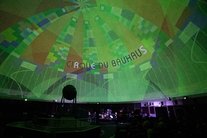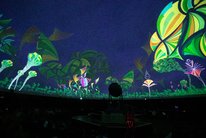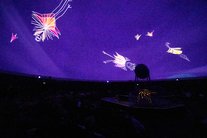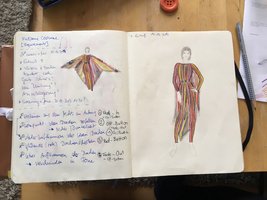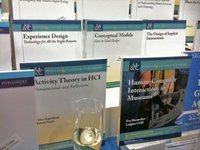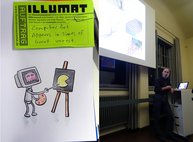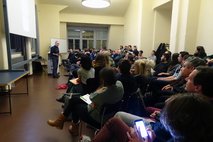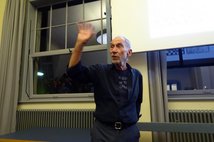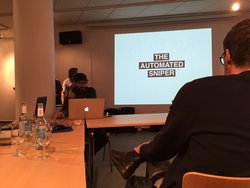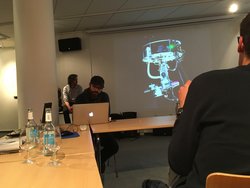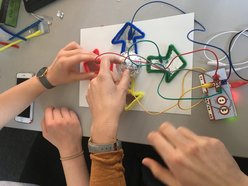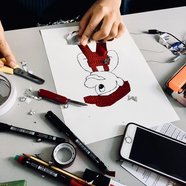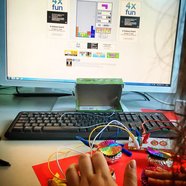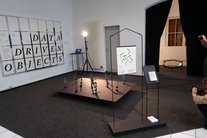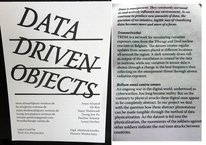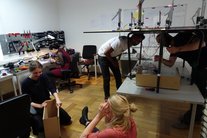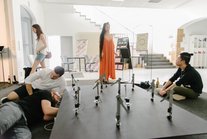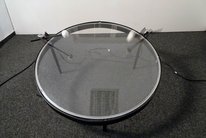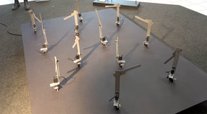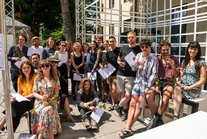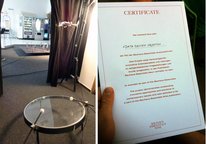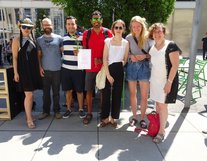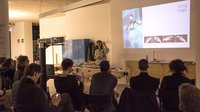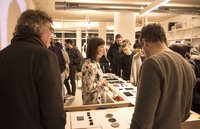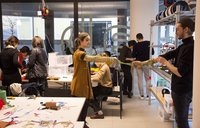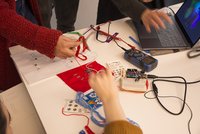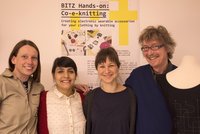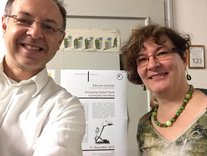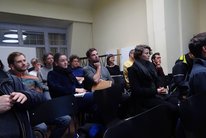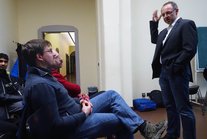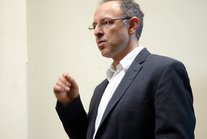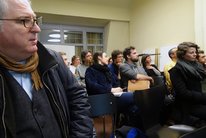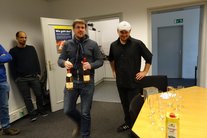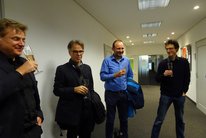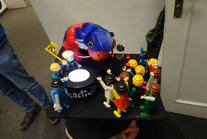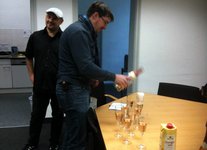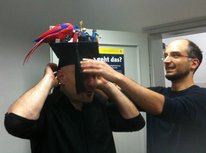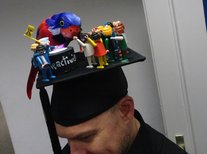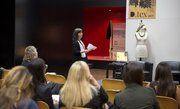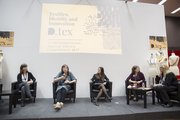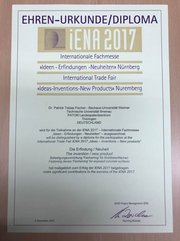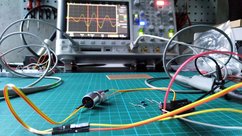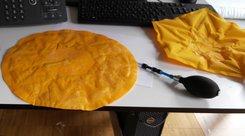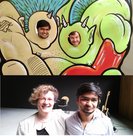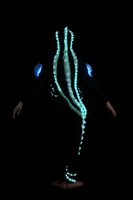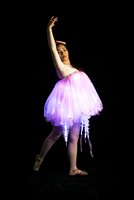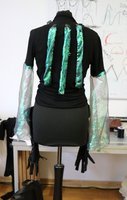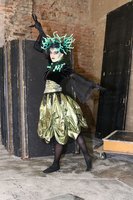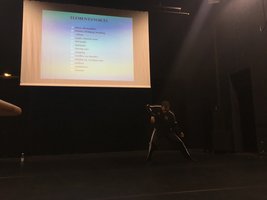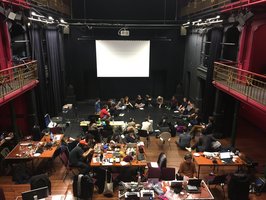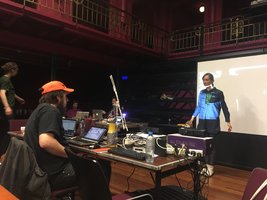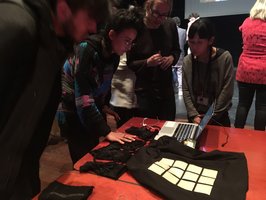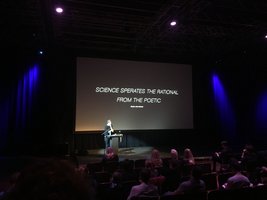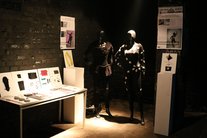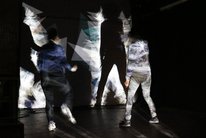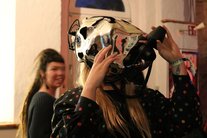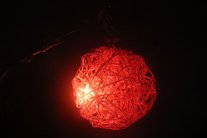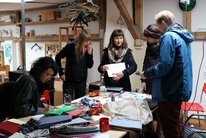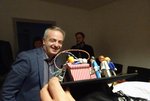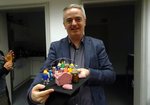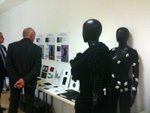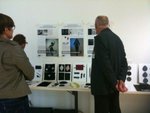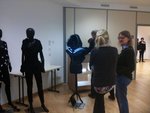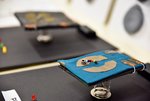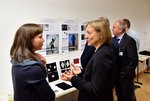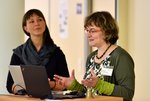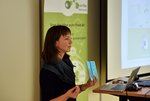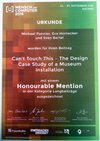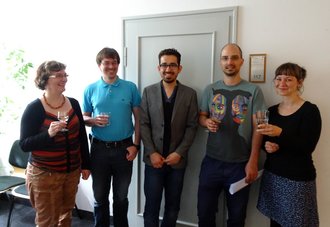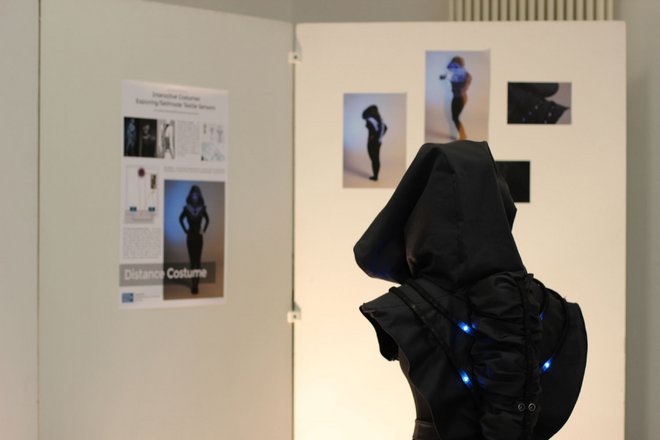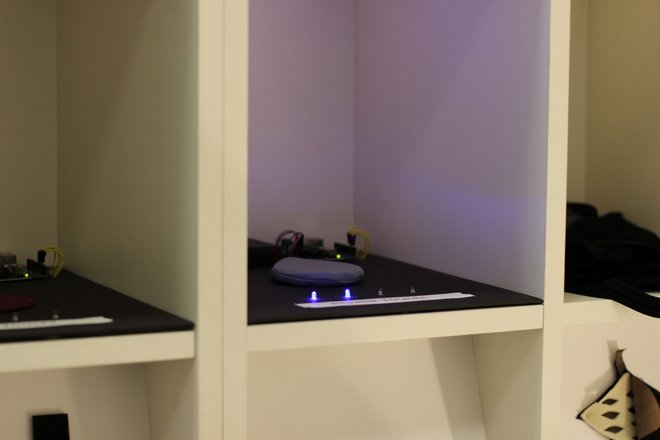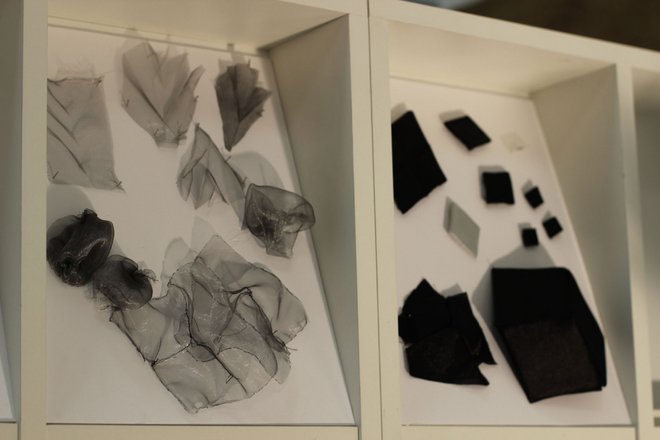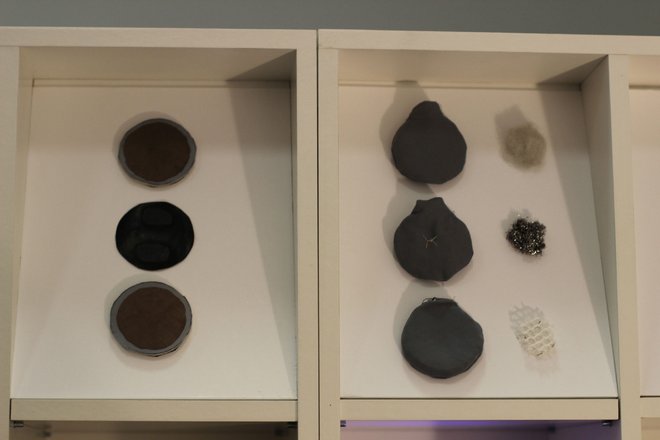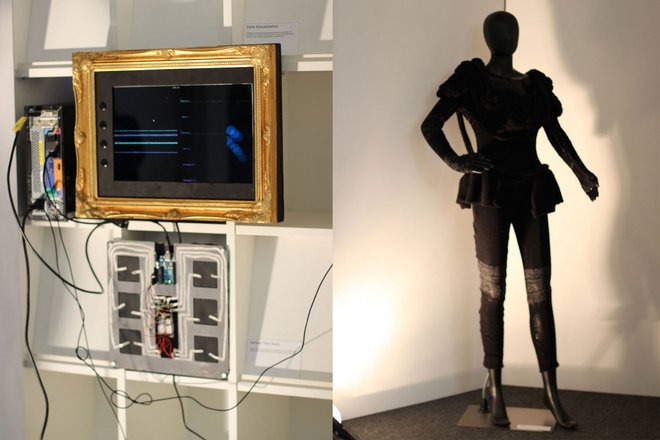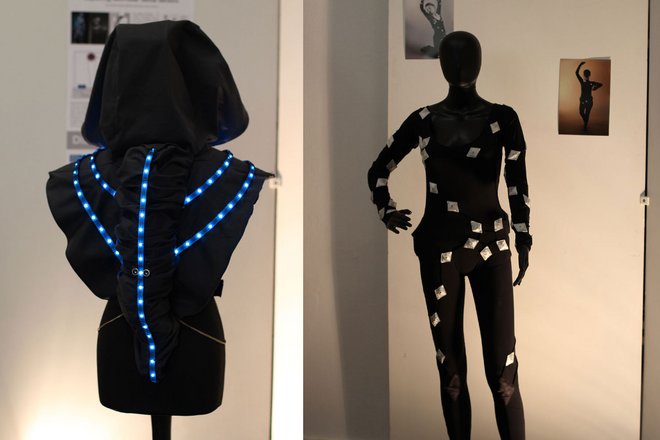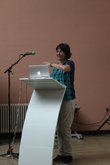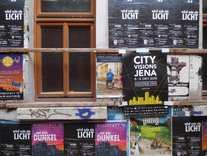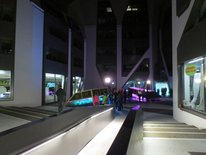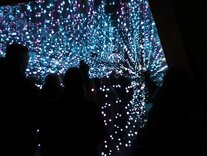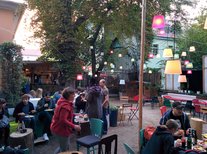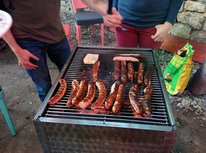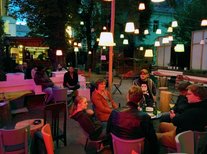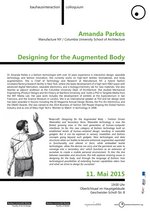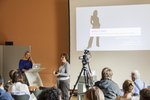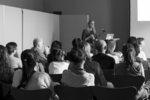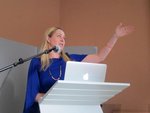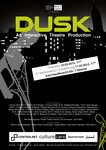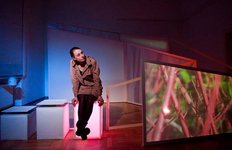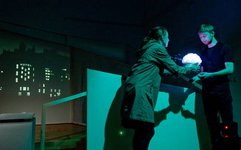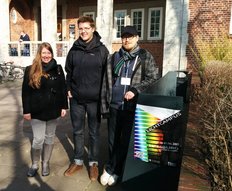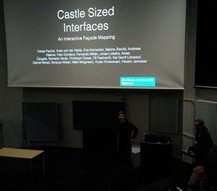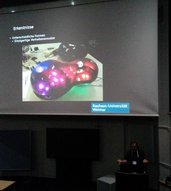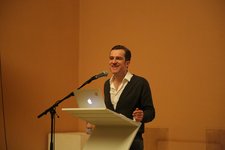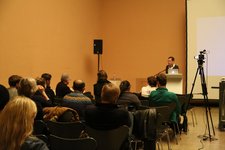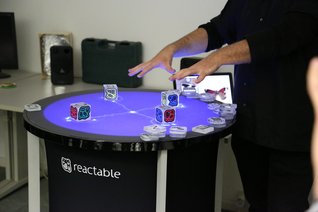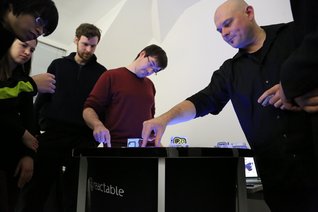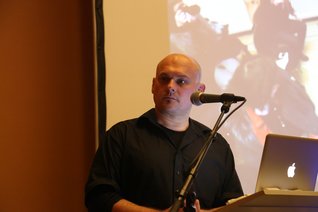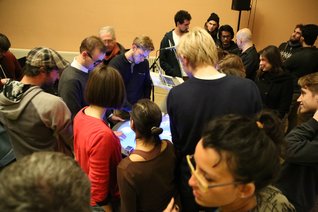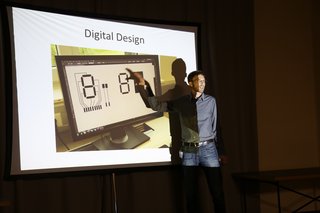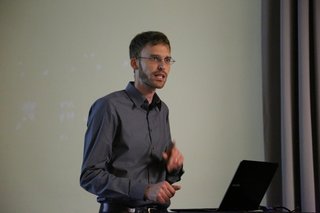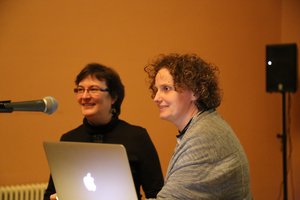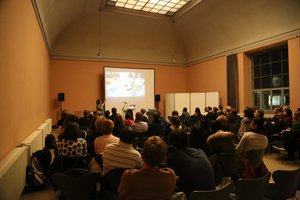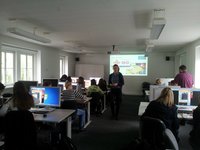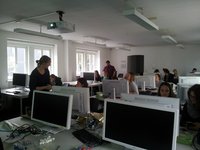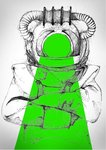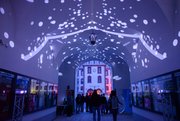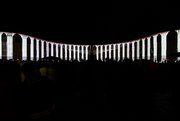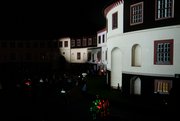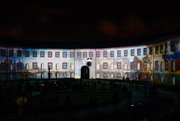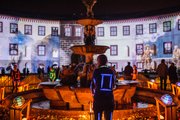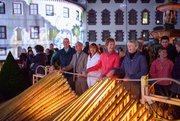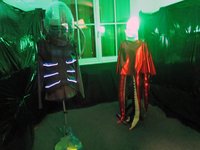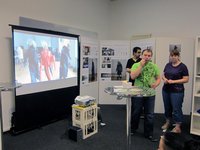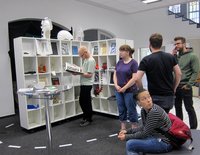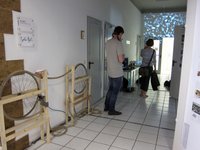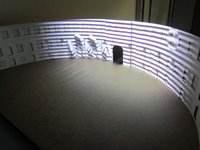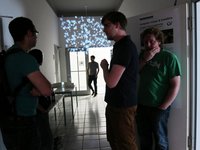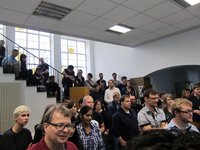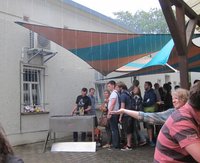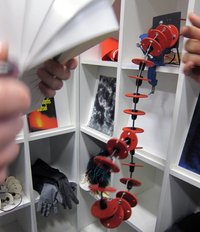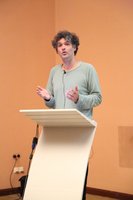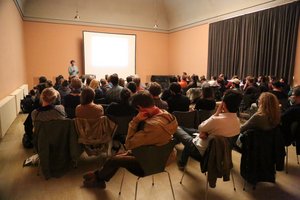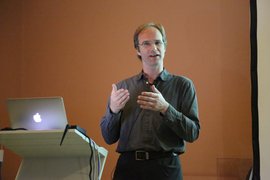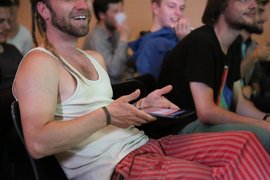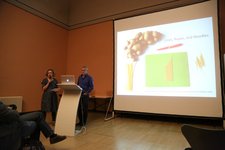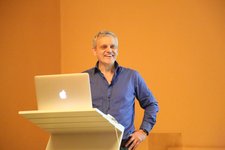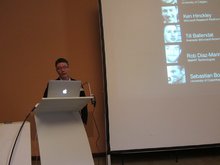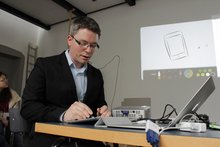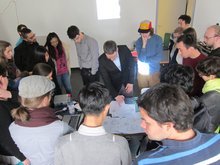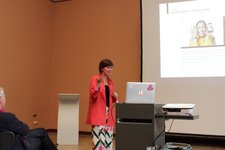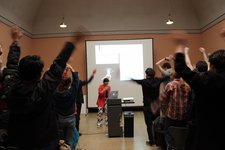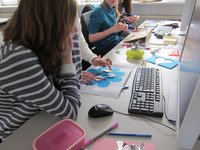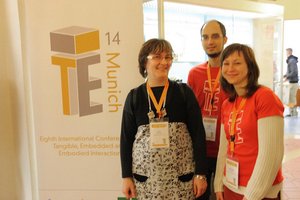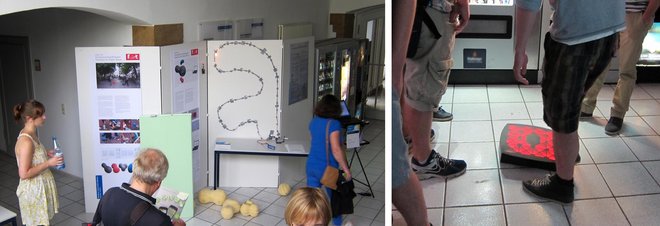Two >Futuring Machines< Events in June 2024!
How will we live in 50 years? The >Futuring Machines< project has been busy developing the user interface and different modes of co-writing. It now runs the first set of workshops where participants will be cowriting speculative fiction with AI. We'll imagine future scenarios, reflect on possibilities, fears and hopes, and put this all into short stories, supported by the AI-based co-writing tool that developed by the team.
The first workshop »Zukünfte schreiben mit KI« will take place during the 'Night of Writing' on 13th June at the University Library of BUW (Session 1: 19:15 bis 20:45; Session 2: 21:30 bis 23:00) in the PC-Pool of the Library. Registration here
The second workshop »Queer Futures schreiben mit KI« will take place during the Campus Pride Week on 18th June (Session 1 — 14:00 bis 16:00 ; Session 2 — 17:00 bis 19:00) SCC PC-Pool 2. Registration: here
Preetha Moorthy joins us for her PhD
We have a new associated member and external PhD student in our group - Preetha Moorthy was one of the first students in the HCI Master programs and did her theses with us. She has set up a Usability lab at the Medical Faculty Mannheim, Heidelberg University within the university hospital and worked for a couple of years now on introducing usability procedures for medical devices and doing research on this. We've remained in contact, and Preetha has given guest talks on 'Usability in the medical domain' for our introductory HCI course. As of May 2024, Preetha has been accepted into the doctorate program of the Faculty of Media, and will do her PhD under joint supervision from me and Prof. Dr. Till Nagel from the University of Applied Sciences Mannheim.
Attending TEI'24 in Cork, Ireland
and again, HCI group and students attended a conferences, this time TEI'24 in Cork, Ireland (TEI =Tangible, Embedded and Embodied Interaction) from 11-14.February. An added reason (to having presentations) is that Trevor Hogan, who did his PhD with Eva, was main conference chair along with Luigina Ciolfi who's also one of our longstanding colleague-friends.
We were busy: On Sunday, Eva was one of the Doctoral Consortium chairs (along with 3 other international faculty members), while everyone else was having fun with hands-on workshopy studios. 2 of our students as well as Rosa were Student Volunteers (Rosa also had been a Web chair), and another 2 participants from the student project 'A touch of data' from WS22/23 came to Cork to present the installation that they had built and its evaluation 'A Fair Game' as a talk (paper co-authored by Mufleha, Victor, Sanghramita and Yara). Rosa presented her paper on 'Metaphors and `Tacit' Data'. And Hannes had 2 demos on inflatables to showcase at the Demo night. On the last day of the conference, Eva also co-moderated the 'Town Hall' meeting, where attendees discuss the conference and its future. TEI was big again with around 200 attendees, and we met with a lot of old and new friends and research colleagues. Also, Cork was a fantastic city for a conference with many options for cozy pubs to continue discussions well into the night, often with live music ...
'Futuring Machines' Kickoff
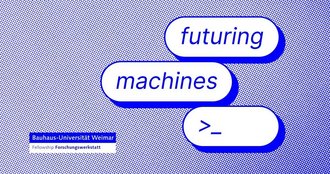
"How can the co-writing of fictions and speculative short stories together with Generative AI support critical reflection on future visions and foster perspective change?" — This is one of the central questions of the "Futuring Machines" project, launched in 2024.
Jordi Tost, who does his PhD with Eva via the Faculty of Arts + Design PhD program, was awarded a 1-year Fellowship stipend (+ project money) for a collaborative project on "Futuring Machines. Praxisbasierte Exploration von KI als algorithmische Irritation im Kontext partizipativer Zukünfte" (exploring AI as algorithmic irritation for participative Futures), which will explore the use of Large Language Model AI in story elicitation, then using this for participatory workshops with citizens. The 'Fellowship Forschungswerkstatt' is funded by BUW. The project is located at and affiliated with the HCI group. Other project members are Dr. Johannes Kiesel and Marcel Gohsen from our Intelligent Information System group, and Mattis Kuhn from the Faculty of Arts and Design.
HCI group and students at MUM'23 in Vienna
We were well represented at ACM MUM'23 at TU Vienna in early December. Given Eva's connections to Vienna (she used to work there for 1,5 years ages ago), plus TU Vienna being Erasmus partner for the HCI Master program, this was not just for the conference, but also an opportunity for meeting past and future collaborators. It was great to meet HCI researchers from all over the world and hear about the latest trends in mobile and ubiquitous multimedia.
Annika took part in the Doctoral Consortium, discussing her PhD, Laura (staff member on GROOVE) presented a poster about her Master theses about 'Tattoo-based biofeedback interface for tension headache', Nasim and Urszula (HCI Master students) were presenting posters about their last student research projects (Technology for Staying in Touch with Pets: The Future or Future Not to Come. and Aligning preferences: Co-Designing Wearable Solutions for International Student Well-being). Furthermore, HCI Master students Konstantina and Nabanita, as well as Annika were Student Volunteers (SVs). And, on very short notice (due to the snow weather chaos other mentors had got stuck on their train journey to Vienna) Eva got invited in as additional mentor for the Doctoral Consortium morning session. The venue was amazing (TU Vienna main building top floor), we had a big Christmas market just outside the building, and Vienna in the snow was beautiful! MUM being a smaller sized conference with around 100 participants also provided ample opportunity to talk with other researchers. Lots of pictures...
Kevin presented Bibo and its development process at the WUD 23 in Leipzig
Kevin Lefeuvre who used to work on the (finished) ReThiCare project, gave a presentation about the concept, design, and development process of Bibo 'the dancing cup' at the World Usability Day in Leipzig in November. Attendees enjoyed hearing about the extended people-centered design process and provided lots of positive feedback.
Meeting HCI graduates working in UX
On Saturday, October 21st 2023, we invited the HCI students to HK7 for a session where former HCI students who now work in the UX world talked about their career journey, their job, and provided tips for those who aim for a UX career. Four of our graduates were able to take this time (all could only join online) and we are extremely grateful for their time and effort. Around 20-25 students attended (there was some coming and going over a 3 hour period). Annika took a screen shot of us.
Successful Conference Presentations from Margo and Hannes
Well, we've been busy recently! Margarita published a full paper based on her M.Sc. theses (with more detailed analysis) at the Academic Mindtrek conference in Tampere, Finland (3-6.Oct.), which had a track on 'Augmented Cities and Communities', thus providing the perfect topic match for her work on 'Exploring the potential for Smart City technology for Women’s Safety'. This was also a great chance for research connections on the topic of feminist participatory approaches for Smart Cities. On top, Margo received the price for the best presentation!
Then, Hannes presented a full paper co-authored with Kristian about their development of new rapid prototyping methods for sheet inflatables, a the ACM Symposium on Computational Fabrication (SCF'23) in New York (8-10.Oct.). His presentation on 'WireShape - A Hybrid Prototyping Process for Fast & Reliable Manufacturing of Inflatable Interface Props with CNC-Fabricated Heat–Sealing Tools' went very well, and can be viewed here (his talk starts at 51:08), as the entire conference was recorded.
Erfinder*innen Workshop – Shape-Changing Data Physicalisation (28+29 Sept. 2023)
Rosa and Hannes organized this year's 'Inventor's Workshop' for the German Fachgruppe 'BeGreifbare Interaktion' (tangible interaction) within GI's HCI chapter. These are hands-on, creative meetings, as a counterpoint to the talk and demo based yearly scientific workshop held at Mensch&Computer Conference. 12 participants attended from Weimar, Chemnitz, Dresden, Regensburg, Bremen and even Saarbrücken, with a mix of Master students, PhD and Post-Doc researchers. An introductory keynote was given by local Media Design/Arts Professor Martin Hesselmeier.
The event ran from Thursday post-lunch, with a joint dinner at PhoCo, to Friday afternoon (with Mensa lunch). Rosa introduced data physicalisation, and Hannes gave an introduction to shape-change, focusing on inflatables (a lot of fun, especially showing how easy it is to create volume on the cheap). Participants first brainstormed on data to use and ways to present it, and then explored simple prototype concepts. All groups went for inflatables, using the heat-press sheet material process that Hannes and Kristian have developed last year (to be published at ACM's Symposion on Computational Fabrication in a few weeks time!), which allows for quick experimental iteration, here manually bending the wires that fuse the sheets under heat. Groups presented their designs, from concept to demoing prototypes, before catching trains home. This was fun and a great networking event! Thanks to Rosa and Hannes for organizing and running this! (photos all by Eva)
The HCI crew at Mensch&Computer 2023
We've again been well-presented at the German HCI conference Mensch & Computer (in Rapperswil, Switzerland, 3-6 September). Hannes and Rosa were on the organising team for the annual workshop of the FG Be-Greifbare Interaktion (tangible interaction). Moreover, this time, 4 (!) teams of our HCI Master students submitted to the Student Research Competition, reporting on findings from last semester research project. 6 of the involved students (Nabanita, Pankhuri, Nasim, Hyesoo, Jule, Urszula) traveled to attend the conference, accompanied by Margarita. All were given positions as Student Volunteers (short: SV's).
Students had the chance to present their research both with a poster and a short presentation. With 9 submissions overall to the Student Research Competition, we are proud of our students to have received 2nd and 3d place! This was for 'Women’s Solo Journeys' and 'Technology For Pet Owners'. Students greatly enjoyed the conference, which gave them an insight of both the research and the UX industry world (as M&C is run together with the German UPA)
Sniff... the ReThiCare project ends
we have been for a while in the last steps of finishing things for the VolkswagenStiftung project ReThiCare, where, due to various reasons, including the pandemic, we had been able to extend its runtime. For us, it was important to not only produce academic publications, but to also document at least some of our work in a way that is easily accessible to a wider public. For this, we have been creating a brochure, and have sent this out to collaborators, participants in our studies, people working in the research field, elderly care institutions and teaching institutions, and anyone we could think of for whom this would be inspiring and interesting.
It was a bit unexpected to see how big a stack 1200 brochures are! Luckily the department had space when this arrived... Then it took a while to sort out addresses, pack them up, and arrange for shipping, but now we are mostly done. We still have quite a lot here (in German, English, and Danish), so if you'd like one, send Eva a message! Or download them here (German) (English)
Coinciding with the brochure, Eva was invited as one of the speakers to the Geriatronics Summit 2023 in Garmisch-Partenkirchen, a yearly event run by the Munich MIRMI group in collaboration with Diakonie Bavaria on robotics in elderly care. This small event brings together international experts in the field with practitioners in care. We were excited to be able to present ReThiCare, focusing on process and exemplary outcomes. With these things, a project we thoroughly enjoyed comes to an end... We already miss the team!
Project GROOVE started, with Laura Simon as new staff
Late June 2023, we held the Kick-Off Meeting in DBL for our new project GROOVE, which will investigate how to enhance the feeling of being in synchrony in social VR. GROOVE is funded by German BMBF and is a collaboration between Prof. Fröhlich's VR group in Weimar, the Usability group led by Prof. Ehlers and our HCI group in Weimar, Prof. Döring from TU Ilmenau (Media Psychology), and Consensive (a VR spin-off company from BUW), and Brandenburg Labs in Ilmenau.
The core idea of the project is to improve 'felt alignment' of movement (entrainment), so that VR-users feel they are moving in synch, by reducing latency on some aspects on the technical level, and via interaction design (e.g. delays and phase-shifts in the visualisation, as well as strong visual rhythmic cues). Following a phase of basic research, we will develop and test a number of social VR apps that allow groups to engage in bodily activities over a distance.
As of July, HCI Master graduate Laura Simon has joined us on the project as a new staff member. Welcome to Laura!
Welcome to Margarita Osipova
In April 2023, Margarita took over from Michaela Honauer and Britta Schulte (unfortunately, now both left us...). Margarita studied HCI at BUW and recently graduated. She currently works on her expose for a PhD topic. She's gone in at the deep end, managing the practical sessions for our HCI Introduction class and teaching a student group project module. We are glad to have such an energetic and well-organised new group member!
Goodbye and all the Best to Michaela Honauer
We are proud, as well as sad, for Michaela Honauer to leave us in December 2022 (very short after finishing her PhD) for a fantastic Post-Doc position at the University of Twente, the Netherlands, in the Human Media Interaction group, where she will continue to work on e-textile wearables. We wish her all the best and hope to continue to see her once in a while!
3 Papers presented at MUM'22 in Lisbon - and an Honorable Mention for Annika!
Rosa and Annika traveled to Lisbon together in late November for the Mobile and Ubiquitous Media conference (MUM'22). Annika presented a paper on a study for her PhD on SmartHome technologies and people's expectations. Rosa presented findings from Arika Dodani's Master theses (mentored by her), which contribute to our FluidData project on the UX of data physicalisation, as well as joint work with Sujay Shalawadi and Florian Echtler (both ex-BUW people, now at the University of Aalborg in Denmark), exploring avenues for Human-Centered Self-Tracking. And - Annika got an Honorable Mention for her paper! Congratulations!
HCI group and HCI Master students at MuC 2022
Weimar was highly present at the German HCI conference Mensch und Computer (MuC) 2022 (4-7.Sept.) in Darmstadt ! Being there was extra nice, as TUD was Eva's study place, so there were a lot of memories as well as confusions (familiar, familiar - where am I now, what changed?).
Rosa was involved in running the workshop of the BeGreifbare Interaktion (Tangible Interaction) group. Our external PhD student Annika had a short paper presented as poster. Two of our HCI Master students (Max and Margarita) had submitted to the Student Research Competition. Posters and Student Research contributions did get exposure during the 1-Minute-Madness session (an exercise in keeping it to the point, as time runs automatically on and you get shoved off the podium if you overrun!). Max presented his work (part of his Master theses) as a demo. Eva co-chaired the Doctoral Colloqium with Hans Gellersen (Lancaster/Aarhus). And Eva had been invited to present a paper that was published at ACM CHI 2022 (each talk session had one such invited talk), which is shared work with BUW graduate Katta Spiel and two other academics. Finally, five HCI Master students were Student Volunteers (SVs), helping with running the conference, getting free registration. They all had a great time and gained insight into the research community.
Photos here are a mix of personal photos and those from the MuC22 website
Summaery 2022 - live and in colour!
After 2 years pause, our yearly University summer show finally took place fully live again. It was fantastic to see people and their work, party and talk, and to see so many things... While summaery goes from Thursday evening to Sunday afternoon, the Computing's Open Lab Night only takes place from Friday afternoon to Saturday afternoon, and this year was run 15+16.7 at our new domicile at Schwanseestr. 143.
Both student projects exhibited, with posters and demos from Michaela's 'Let's have fun – exploring playfulness in interaction design' project, and posters (most of them interactive, as students were using the chance for collecting responses for their research) from Britta's 'Beyond Pink – Gender, Identity & Smartphones' project. Furthermore, several students presented their Master theses research and prototypes. For most, it was the first opportunity to publicly show their work.
Both S143 and us got loads of visitors, and students were exhausted but exhilarated from the experience, as well as from the entire event. Images here are partly our own, partly by students and partially from the University's official photographer of the Summaery.
Finally there was also the Graduation ceremony of the Faculty of Media on Saturday late afternoon. Eva was honoured to do a short speech for the Computing department and to congratulate and hand over certificates to all graduates present.
30.6.22: Michaela defended her PhD theses in Kolding, Denmark
Michaela Honauer (initially started at BUW with her Doctorate studies) has defended her PhD at SDU (University of Southern Denmark) with her 2nd supervisor now being 1st and vice versa. Her theses title was 'Integrating Wearable Technologies in the Performing Arts: A Holistic Approach to Interactive Costuming.'
Michaela and Eva travelled to Kolding for the defense, which was conducted in a hybrid mode, as the 2 external examiners were not able to come in person. We were very happy to have gained Professors Joanna Berzowska from the University of Concordia (Canada) and Sofia Pantouvaki from Aalto University (Finland) as her examiners. Prof. Harun Kaygan from SDU chaired the defense. But at least all supervisors could be there, so we were excited to see Prof. Danielle Wilde again.
Michaela's theses featured 4 publications and a 100 page synopsis/reflection. It was evaluated as exceptionally strong, filling a research gap in the domain of (interactive) costuming, at the intersection between HCI, Interaction Design and Costume Research.
Finally - printed interactions magazine with our article
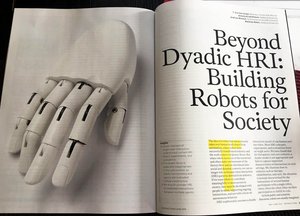
The May/June 2022 issue of ACM interactions magazine features an article written in the context of the RethiCare project, written with project co-PI Andreas Bischof (TU Chemnitz), and two researchers from Aalborg University (Antonia Krummheuer & Matthias Rehm). They had come to similar conclusions as our early RethiCare paper on 'The interactive enactment of care technologies'. In this, based on analysing interactions with motorized lifting devices for moving elderly people from bed to chair in a care home, we had argued for a non-dyadic understanding of human-robot interaction.
The interactions article combines our 'lifting device' study with Antonia and Matthias' case study of a reminder robot for people with cognitive impairments, and calls for understanding robotic functionality and agency as socially situated and mutually constructed in collaborative use scenarios. We believe that HRI (the field of Human-Robot Interaction) can learn from CSCW on how to take account of multi-agent scenarios. It is great to finally have the printed version in hands!
Embracing UX with beeps and pulses: UX in the medical world!
Imagine building a medical product and then running a clinical trial to realize 1 year into a long-term study that people can't manage to use the device or app as intended, and the device/app needs redesign and the study to be redone... Imagine user errors and mistakes (or simply distracted and overworked health workers) when setting up clinical devices...
On May 16th, our Alumna Preetha Moorthy gave a guest lecture on UX in the medical world in the context of our HCI Intro course (open for all other students). Preetha graduated in 2017 from our HCI Master and did her theses with our group. Now she is a Usability Engineer / User Experience Consultant at the Centre for Preventive Medicine and Digital Health at the Medical Faculty of University Mannheim, and has built up a usability/UX centre there. She told us about her work, the specific demands and processes for medical products (a usability check is now required for certification!) and some of her current projects, as well as lessons learned. We had a super-intensely listening audience, and loads of questions after the talk, right until the end of the time slot.
Paper on our friendly cleaning-robot Sanne presented at ACM CHI 2022 in New Orleans
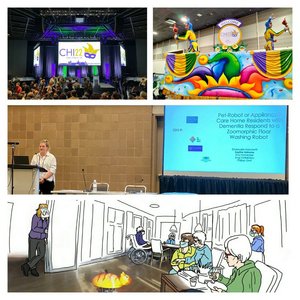
Our BUW alumni Sophie Grimme presented our paper Pet-Robot or Appliance? Care Home Residents with Dementia Respond to a Zoomorphic Floor Washing Robot at the biggest (and most important) HCI conference, CHI. This paper reports the work of our SDU team members on developing Sanne and her Master theses on its evaluation in a carehome in Odense, Denmark. While the conference was hybrid (so there is a video presentation), Sophie was able to travel to New Orleans and presented to a live audience as part of her job with her new employer the OFFIS research center in Oldenburg, Germany. We had some really good feedback and Sophie could enjoy her first conference!
Talk at World Usability Day 2021 Leipzig
Eva gave a talk about the group's work on the Interaction Design and UX of interactive toys for young children, bringing together work from Preetha Moorthy (Master theses), Elisabeth Scholz (Bachelor theses) and Gabriel De Ioannes Becker (ongoing project), and Michaela Honauer. The video from my talk is finally online (several months later)
WUD is held is held annually on the second Thursday of November, across the world in local events. The WUD Leipzig was apparently the only German WUD that took place in presence, with restricted audience. It was great to speak in front of real people again (even if the light was blinding)!
Three ReThiCare papers accepted for publication
We've been busy writing over the summer, with finally a lot of the work in project ReThiCare coming into fruition. Early November, our Danish SDU project partners and us will present 2 papers at IHAW 2021 (ICT for Health, Accessibility and Wellbeing) on 'Bibo the dancing cup - Reminding people with dementia to drink' and 'Don't be afread! Design of a playful cleaning robot for people with dementia' (the latter is based on Sophie Grimme's HCI Master theses), and just these days, a Pictorial about one of our more conceptual works was accepted for MUM 2021.
video channel set up
We have recently set up a video channel for all the videos that have been accumulating over the years from the group, in particular for performances, demo videos and documentation of interesting prototypes vimeo.com/hcilabweimar/
Publishing Successes - CHI and C&C 2021
We are involved with two papers that will be presented at CHI 2021 these days: Loraine Clarke (Eva's PhD student back from Strathclyde, Glasgow, meanwhile a lecturer at St. Andrews) had a paper accepted about a major study that is part of her PhD: Fighting Fires and Powering Steam Locomotives: Distribution of Control and Its Role in Social Interaction at Tangible Interactive Museum Exhibits. Also, Rosa van Koningsbruggen will be presenting a full paper on her Master theses done at TU Eindhoven on Understanding the Design Space of Embodied Passwords based on Muscle Memory. And Rosa's on a roll, the first paper on research done in the FluidData project got accepted for Creativity & Cognition 2021, "It's just a graph"– The Effect of Post-Hoc Rationalisation on InfoVis Evaluation and received an Honorable Mention Award.
Welcoming two new external PhD students: Jordi and Annika
Our group has grown quite a bit with the start of two new external PhD students. So far we have only met them both online, but we hope that summer allows for at least an outdoor get-together!
Jordi Tost (working at University of Applied Sciences Potsdam, IDL Interaction Design Lab) was admitted to the PhD program of the Faculty of Arts & Design and started in WS 2020. His work on 'Inconvenient Design' will look at how Inconvenience can be utilized as a Critical Approach towards a More Responsible and Reflective Design. Annika Schulz (Robert Bosch GmbH. Affective & Cognitive Institute) was admitted to the Doctorate track of the Faculty of Media early in 2021 and will work (in collaboration with Prof. Oliver Korn, Hochschule Offenburg) about Tangible Interaction with Digital Information on Natural Surfaces.
our first online conference hosting - FIfF-Kon 2020
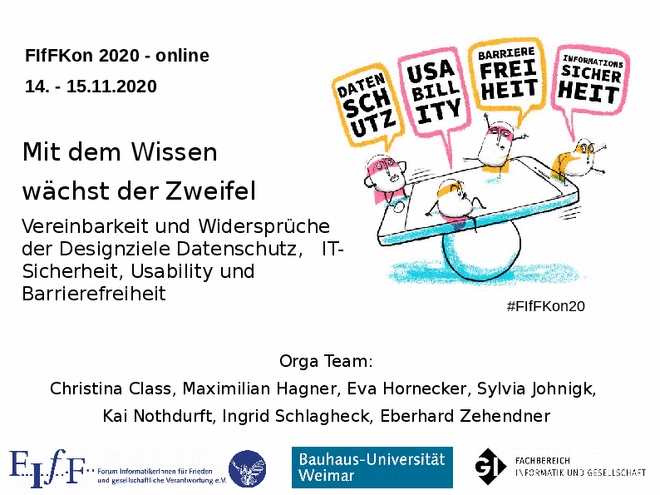
It had been planned that FIfF-Kon 2020 would take place in Weimar, hosted by our group... it now ended up all taking place online. There were a few hickups (including cat-induced tech issues), but in the end there were great talks and discussions and a happy audience.
FIfF is an organisation (gemeinnütziger Verein) that educates the public, comments and works on issues related to computer technology and peace, social responsibility, privacy etc (it is the sister organisation of US' Computer Professionals for Social Responsibility CPSR). The topic of this year's conference was the compability (or contradictions) between the goals of ensuring privacy, IT-security, usability and accessiblity. All of which got suddenly even more pressing through the pandemic shift to online media!
The conference was run online on BigBlueButton. Videos from talks and podia discussions will be made available on FIfF's website.
Various people from BUW helped out, thanks in particular go to our Weimar students who helped immensely with setting everything up, showing the conference organisers how to do stuff, and assisting in tech trials deep into the night etc! It's been an adventure...
Welcoming Lisa
Lisa Guth has joined us for the next couple of months on a 50% position. She will be running the practical sessions for our 'Modellierung' lecture, for the 1st semester bachelor students. Lisa has studied for her bachelor and Master Computer Science For Digital Media in Weimar.
good news in weird times
These truly are weird times... We are working in home offices and only occasionally at Uni (staff are allowed in, but the Uni is closed to students). Those who don't live in Weimar have moved everything needed to home offices and workshops. And we've begun our first semester of online teaching, which has taken up a lot of energy and time (replanning everything and making it suited for online delivery, thinking up new formats, recording lectures, etc etc. We are curious how well it all works out, and we already are missing the personal contact with our students (and with each other)!
There's also been some HAPPY NEWS: Michaela Honauer won a Best Paper Award for her paper 'Overcoming Reserve – Supporting Professional Appropriation of Interactive Costumes', which reflects on her 2-year collaborative work with the Kinder + Jugend-Ballett Altenburg. This was going to be presented at DIS (Designing Interactive Systems), which is now going to take place virtually, online (sad when having an award, which normally means getting flowers and presents...).
Also, Eva Hornecker was appointed to the Editorial Board of ACM's Transactions Journal for HCI (short ToCHI). (as someone on Facebook commented, we academics are probably some of the few people who celebrate taking on additional work!)
And we have 2 papers from the RetTiCare project accepted for the NordiCHI 2020 conference:
"Hospital beds, robot priests and huggables: a (fictional) review of commercially available care robots ”
"The Interactive Enactment of Care Technologies and its Implications for Human-Robot-Interaction in Care”
First purely online theses defence
Life has changed a lot in these past weeks. We've had the first purely virtual, or online Master theses defense, which also was useful for exploring the new systems being installed at Uni. Liselot Ramirez presented her theses on Mixed Reality interfaces for Smart Home control, a project done in collaboration with the 'Intelligent Technical Design' group in the Faculty of Civil Engineering.
FluidData DFG Project - Welcoming Rosa
In March 2020, we welcomed Rosa van Koningsbruggen to our team. Rosa did her Master in Industrial Design at TU Eindhoven, where she gained experience with design research, rapid prototyping and qualitative research methods. She and Hannes Waldschütz will work on the DFG-funded FluidData project, which investigates the user experience of data physicalisation, focusing on the role of materiality and of shape-change. We build on and collaborate with Kristian's work on soft fluidic activation.
11.11 2019 - Bauhaus.Interaction Kolloqium with Elizabeth Buie
Elizabeth Buie visited us for the Kolloquium in November. Elizabeth has a unique career, spending 30+ years in UX practice, in particular with US government agencies, then doing her PhD in the UK (instead of retiring), and now working half-time with a UX consultancy in the UK.
In the early afternoon, Elizabeth Buie gave a guest lecture as part of Eva's introductory HCI class on her Usability/UX practice, titled: „From practice to academia and back: Reflections on how the two sides of the "divide" can enrich each other“. We had an hours lecture and then half an hour for the many questions from the audience about UX practice in industry, the role of an University education for this, UX methods etc. Elizabeth also reflected on how her PhD inspired her to expand her range of UX methods.
Then, in the evening, Elizabeth gave a presentation for the Kolloqium about her PhD work: Techno-Spiritual Design for Transcendent User Experiences, with a focus on the methods she used and partially invented for this novel domain, such as design games, design fiction and poetry. Again, we had a lot of discussion, and as usual, went for dinner with our guest.
Another ReThiCare Meeting in Weimar
Sept 30 to Nov. 2nd we held another ReThiCare meeting in Weimar (our VolksWagen foundation funded project), this time in beautiful Palais Dürkheim, courtesy of IKKM. We discussed our insights from working with Diakonie Sophienhaus Weimar and visiting ‘Department of the Elderly and Disabled’ at Odense Commune, discussed successes and failures of technology in care contexts, and engaged in a prototypical session of ideation. It was a good but exhaustive 3 days in great surroundings and atmosphere, in a team that is gelling together.
Exhibitions, Exhibitions...
Currently it seems we are all at exhibitions, involved in some way or the other...
BUW is featured this year as guest at Ars Electronica's CAMPUS exhibition, and as part of this collection of work from Weimar, some of our members' work is on show (and they will be there). Kristian Gohlke (together with Christian Wiegert) show 'Bubbles and Clouds – Illuminated Interactive Inflatables', interactive pneus based on Kristian's PhD work. Hannes Waldschütz' “Machine that waits for God” (which was started in 2007).
And last weekend, Eva Hornecker followed the invitation to hold the opening speech for Galerie Eigenheim Berlin's exhibition 'ALL DAY REVOLUTION – unsere Liebe Digitalität', showcasing work from BUW-related artists about digitality, touching on topics of simulation, empathy machines, AI, surveillance...
The team at Summaery 2019
We used the opportunity to take some group photos during Summaery 2019. Here is the current team, outside (orange truck photo): Eva (middle) the group lead, Kristian (left) PhD student with us and working on RethiCare with our Product Design partners, Hannes (bottom right) teaching and research assistant, Lena (top middle) working on RethiCare with us, and Britta (top right) teaching and research assistant. Photo on the right is in the Interface Development Lab (Missing: Michaela, currently on leave)
Interactive Costume for a Full Dome Performance
Every year the international Full Dome Festival takes place at the planetarium in Jena. It's primarily an event for full dome projections and, recently, is also explored as an interactive medium. This year, it was dedicated to the theme BAUHAUS due to our 100th anniversary. The theatre performance LE CIRQUE DU BAUHAUS was developed for that occasion and combines live performances with full dome projections.
Michaela created an interactive costume for a performer who dances during the short movie SEEDS, created by students Maximiliane Nirschl (story & animation) and Vanessa Zuber (sound design). The performer's motion triggers the light pattern of the costume and colours freeze when the performer stands still. The premiere on May 22nd 2019 and a second performance on May 26th were fully sold out. Some visitors said after the openning night that this was their highlight of the show ;)
CHI conference with the team and book launch 'Human Computer Interactions in Museums'
Eva, Hannes and Britta attended CHI in Glasgow, UK. Britta had a presentation on research that forms part of her PhD work, while Eva brought a poster along about a recent Master theses project. As always, CHI was massive (4000 attendants) and overwhelming. We all came back with lots of inspiration, new contacts, and ideas.
Notably, the book co-authored by Eva Hornecker and Luigina Ciolfi was presented by its publisher, Morgan & Claypool, and found high interest. This is the first textbook/primer bringing together HCI and museum or visitor studies literature, as an introduction to the field for new theses students or academics and practitioners new to the field.
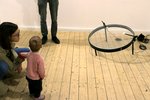
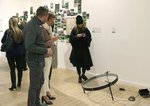
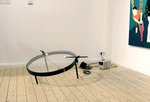
Last year a student project worked on data physicalization with us. One of the resulting Data-Driven Objects, a drum playing data from the TDRM project which monitors radiation around Belgian nuclear reactors, will be exhibited from Friday May 4th to 22th of June 2019 at Galerie Eigenheim, Berlin. We are honoured to have been invited to present alongside actual artists for the exhibition 'EGO vs. ECO'... (egoism vs. ecology)
The Galery runs a series of exhibitions of contemporary Bauhaus University arts/design for the 100 year anniversary of Bauhaus, showing what current/recent graduates, students and staff do. Opening party on 04.05.2019 7pm. Do see us (or our drum)!
Contribution to ERC Amplify Winterschool on “Creating and Evaluating AR/VR/MR Systems”
In return for hosting the international summerschool #WeimARVR last summer, Eva was invited as a lecturer for the ERC Amplify winterschool on “Creating and Evaluating AR/VR/MR Systems” in Kleinwalsertal, which had lively discussions and presentations from PhD students from LMU, Uni Stuttgart, Düsseldorf and a couple of other places.
New staff member Britta Schulte will join us in March
Britta Schulte joins our team on a 1-year post (filling in for Michaela Honauer) from March 2019 to February 2020. Britta will co-teach our student research projects, bringing in some of her own research topics (often using speculative design and design fiction methods, possibly some e-textile work) and run the practical sessions of our basic HCI introduction course.
She is currently finishing her PhD at the Interaction Centre at University College London, and works at the intersection of design, technology and social sciences. Britta brings in an eclectic background with experience in textile design, interaction design, sensor technologies, and the use of design fiction methods, and a strong interest in exploring applications of technology for sensitive areas, such as dementia.

RethiCare (Rethinking Care Robotics) will be led by the HCI group and is a joint interdisciplinary project with BUW's Product Design area (Prof. Wolfgang Sattler), the University of Southern Denmarks Robotics group at The Maersk Mc-Kinney Moller Institute (Prof. Norbert Krüger) and sociologist Dr. Andreas Bischof at TU Chemnitz. RethiCare will explore the design space of non-anthropormorphic, robotic helper machines and devices (which, for instance, integrate with everyday objects and furniture) for the context of care homes.
To re-shape research and design practices and to develop alternative visions for robots in care, new interdisciplinary collaborations and new methods of design and evaluation are needed. The project's interdisciplinary constellation will enable us to re-think from the ground up what care-robotics should look like and ‘do’, using contemporary design methods in a rapid prototyping, design-driven approach. It will apply a user-centered, creative design and development approach in close collaboration with users (2 care institutions as associated partners), guided by principles of universal design, flanked with an integrated science-technology-studies perspective. The project will start in April 2019. (University Press-Statement)
The project Kick-Off meeting took place on 11 and 12 April in the IKKM Lounge in the University Library, with 12 participants from the 3 project partners.
Our guest for the 29th Bauhaus.Interaction Colloqium was Frieder Nake, a pioneer of computer art, who produced his first works in 1963. He has been a full professor of computer science at the University of Bremen, since 1972; and since 2005 also teaches at the University of the Arts, Bremen. In his presentation "Computer Art Appears in Times of Great Unrest", Frieder reflected on how computer art (or algorithmic art) emerged in the 60s in a period of revolt and creation, a decade of revolution in art, but also of societal protest.
It was great to have someone here that we all have a long-term connection with (Hannes Waldschütz and Kristian Gohlke both did their bachelor theses with him, and Eva knows him well from doing her Dissertation in Bremen). The room in VdV was packed and people listened intently, with Frieder being in his element.
HCI Group presents at Theater & Technik Kongress in Düsseldorf
Hannes and Michaela attended the 14th Congress of the German Association of Theatre Sciences (Gesellschaft für Theaterwissenschaften). Their artistic and research work often relates to theatre and technologies. That's why it was worth a try and both applied to present projects at this year's congress dedicated to the topic "theatre and technologies" (Theater & Technik). Based on several case studies, Michaela presented her doctoral research on interactive costuming, and Hannes presented a critical theatre piece that he created a piant ball machine for, which can be remotely controlled by any visitor.
Campus Thüringen Tour, Autumn 2018
We hosted a workshop for school children on October 11th. In sum, twenty girls, aged between 15-18 years, attended the workshop held by Hannes and Michaela. They came from all over Germany and participated in the CampusThüringenTour for the whole week what gave them insights into different STEM study programs at Universities all over Thuringia.
In our "invisible computers" workshop, we introduced them to creating novel user interfaces that go beyond the traditional mouse-keyboard interface. We provided some tinkering material, suggested a few online gaming websites, and then the girls started designing their creative input devices. All applications have been realized with the help of MakeyMakey an Arduino-based toolkit that supports novices to create interactive interfaces with different kinds of conductive everyday materials. It's always amazing!
#WeimARVR - BUW hosted a summerschool on Multimodal Interaction in Augmented and Virtual Reality
It's been a busy summer... Straight after the Year-End-Show Summaery, 16-19 July, we were hosting an international summerschool in the DBL building. Eva was local host to this event, co-organized with an international organizer team, which had an international audience.
The summerschool is part of the NSF-funded exchange program IRES for US students to do internships at German HCI groups and serves to bring them in contact with the wider German HCI research landscape. It received funding via the ERC Amplify Projekt at TU Munich. Besides of the US exchange students who spent 3 months in either Oldenburg or Munich prior to coming to Weimar, their supervisors (PhD students from these Universities) as well as a number of docents for workshops and lectures participated. BUW students had the chance to participate, but unfortunately the timing clashed with our exam period. From BUW, Dr. Alex Kulik (VR-group) gave a lecture and organized a tour of the VR lab, and Prof. Florian Echtler ran a tutorial on working with depth-sensing cameras. Other activities included working with the HoloLens and a conceptual hackathon for social AR experiences in museums.
Please see the website of the summerschool and its Twitter feed for #WeimARVR
Summaery 2018 - Data-Driven Objects project selected for the Bauhaus-Essentials
We are incredibly proud of our interdisciplinary student team (2x product design, 2x HCI, 2x CS) on the Data-Driven Objects project. The resulting work was selected by the Jury for the Marke.6 Bauhaus-Essentials 2018 (this time a publication), along with 14 other works from over 50 contestants.
The course topic was physicalization - making data legible and physical - and we dove into literature on InfoViz, Physicalisation, Shape-Change, worked with motors and movements, and engaged in iterative idea brainstorming on data sources and designs, before picking two: Trommelwirbel gets realtime data from Aachen-based TRDM website that monitors radiation from the Belgian Tihange and Doel reactors via a citizen-based sensor network. The drum evokes the omnipresent threat of atomic radiation, where beat frequency reflects changes in sensor data. Bellum omni contra omnes - the war of all against all - takes data from a website showing cyberwarfare attacks. These anonymous soldiers (for the 16 most active origin-countries) enact the real-time attacks.
Building this has been a huge effort, and the team stood up to the challenge, hands-on supported by our HCI-member Hannes, working on interpreting, streaming and filtering the real-time data from both websites, building the electro-mechanical installation and controlling it, getting done just in time for the Summaery and exhibiting from Thursday afternoon to Sunday.
The Little Mermaid - Final Performances
On May 26th and 27th 2018, we had the last two performances of The Little Mermaid a fairy tale ballet performance. For this performance piece, we have created three interactive costumes - the Jellyfish, the Seahorse, and the Sea Witch. This latter has been created by Michaela in cooperation with the the theatre staff. The two other costumes have been designed and developed by a group of interdisciplinary students in winter term 2016/17 under the supervision of Eva and Michaela.
Finally, all three costumes have been on-stage five to six times over a period of more than one year. It is one of the rare opportunities to stage interactive clothing within a real-life and traditional theatre setting. Reactions from the performers, the theatre staff, and the audience where overall very positive. We have conducted multiple interviews with the performers over the whole time and observed the usage while accompanying all final rehearsals and the performances. Now it's time for a detailed analysis of the collected data - you can be curious to read about the gathered insights soon!
More information: https://www.tpthueringen.de/stuecke-konzerte/die-kleine-meerjungfrau-687/
Welcome to Hannes Waldschütz (15 March 2018)
Hannes Waldschütz officially joined our team today as new research/teaching assistant (Wissenschaftlicher Mitarbeiter), taking over from Patrick Tobias Fischer.
Hannes has a mixed background in digital media and media arts and likes to build intricate technical mechanisms, with a mix of electronics and software. This coming semester, he will teach the student research project on 'data-driven objects' together with Eva.
Michaela at opening FabLab BITZ University Bolzano
On March 9th and 10th Michaela was invited to give the first talk and conduct the first official workshop in the the recently opened FabLab of the University in Bolzano. In her talk (BITZ stories on March 9th), she introduced to interactive technologies in the performing arts and gave an overview on projects she was involved in. She further pointed to some practical insights, best practices in crafting interactive costumes, prospects and challenges of interdisciplinary team work, and showed lots of material samples.
The BITZ Hands-on workshop (on March 10th) was held together with Secil Ugur Yavuz (unibz) and Prof. Alastair Fuad-Luke (unibz). The goal was to explore new ways of making wearables through combining simple electronic circuits with knitted woolen accessories. Participants used an open-source laser-cut toolset designed and produced by the Faculty of Design and Art and BITZ unibz fablab. The workshop introduced a set of instructional cards showing how to design simple electrical circuits and how to use the tools. Together participants explored how to integrate e-textiles and soft circuits into garments. The workshop brought designers, engineers, makers, design students, artists, and citizen of any age together, in order to merge different skills and know how. Participants produced prototypes of wearables and generated potential new applications through making.
Website BITZ: https://bitzfablab.unibz.it/
Albrecht Schmidt at the Bauhaus.Interaction Kolloqium on Dec 11 2017
Albrecht Schmidt, Professor at LMU Munich (formerly at Uni Stuttgart), visited us on December 11th for a presentation in the Bauhaus.Interaction Kolloqium. After a busy afternoon, chatting with students and staff from BUW about their projects, he gave a talk about his current research agenda of 'amplifying the human mind'.
We had a good turnout, with a good mix of students from Computer Science, HCI, and Design/Arts, as well as academic staff in the audience. It was great to finally have Albrecht, who we have collaborated with for many years (e.g. with the TEI conference and the meSch project), here for a public presentation!
Four presentations at MUM 2017 in Stuttgart
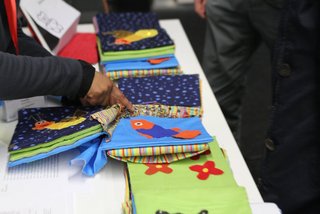
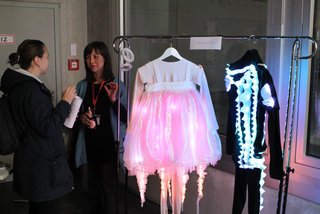
Photos found @Twitter
We have been present with a demo, 2 art track showpieces and a video presentation at MUM 2017, the Mobile and Ubiquitous Multimedia Conference in Stuttgart!
Pieces we'll show will be Preetha Moorthy's Master theses project of an electronics-enhanced children’s touch-and-feel book (demo), Die Ermittler (our mega-big student project in collaboration with the faculty of Arts+Design and Kunstfest Weimar last year, shown in the Arts track), the Mermaid costumes (Art track), and Sonnengarten, a collaboration project with Media Architecture that constituted Till Fastnacht's Bachelor project (in the video track).
Martin Kaltenbrunner defended his PhD on „An Abstraction Framework for Tangible Interactive Surfaces“ on Nov 20th!
Martin Kaltenbrunner is a Professor at the University of Arts in Linz, Austria. He spent the last summer semester as a guest at BUW with Prof. Florian Echtler as his PhD supervisor, in collaboration with our group, and used his sabbatical here to write up his PhD theses.
Martin successfully defended his PhD on November 20th, with Eva Hornecker as second supervisor and Prof. Johannes Schöning (Uni Bremen) as external examiner. In the photos we're enjoying the after-defense celebration with bubbly and the ceremonial PhD mortarboard/cap, illustrating his work on the ReacTable, ReacTivision, and his current research project on musical interfaces for parrots.
Paper Presentation on Interactive Costumes at D_TEX in Portugal
On November 3rd, Michaela presented a paper with the title "Smart Textile in the Performing Arts" at the 1st international textile design conference D_TEX (http://dtex.fa.ulisboa.pt/index.php/en/) in Lisbon, Portugal. We reported on the design of knitted stretch sensors, the concept of the Sonification Costume, and a qualitative user study. The costume was created in summer 2016 by Hauke Sandhaus and Aline Martinez within a university student project. Eva and Michaela supervised the process. See our project website https://www.uni-weimar.de/projekte/costumes-and-sensors/ for more detailed information.
Honarary certificate/diploma awarded @ Patrick Tobias Fischer
An honarary certificate has been awarded to Patrick Tobias Fischer for his invention "Fischerring" a fasetning device for exposed concrete surfaces. He will be distinguished with the diploma for the participation at the International Trade Fair iENA 2017 in the category "Ideas - Inventions - New Products" and making a significant contribution to the success of the iENA 2017.
iENA was held in Nürnberg, 1.-5. November 2017. The international trade fair for “Ideas – Inventions – New Products” brought for four days inventors and licensees from all over the world to Nuremberg. More than 800 inventions still awaiting their step on to the market were presented. Trade visitors from 31 countries met up with the approximately 500 iENA inventors.
ISS'2017 conference 10 year impact award for Eva Hornecker
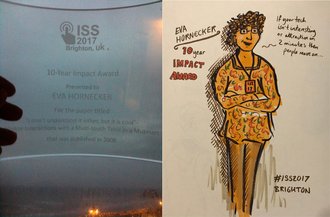
The ACM ISS conference on 'Interactive Surfaces and Spaces' (Oct 17-20 in Brighton) awarded the most influential paper from 10 years earlier, 2008 (then run under a different name and publisher as IEEE Tabletop). The award was given to Eva Hornecker for her paper '“I don’t understand it either, but it is cool” – Visitor Interactions with a Multi-touch Table in a Museum', that documented observations from an ethnographic-style field study.
It is especially rewarding that a paper that is rather unusual for this conference was chosen. And it was great to be in Brighton again, even if just for a day, and to enjoy the wild autumn weather at the seafront, some interesting talks and demos, and to meet the community. Thanks to the organizers!
Presentation on 3D Printing for the Kinderuni (children's university) on 8.11.17
Our PhD student, Kristian Gohlke, will give a presentation on '3D-Druck – das Werken von Morgen' for the annual children's university (Kinderuni - a Germany-wide event series with lectures and workshops at Universities) on Nov. 8th. Kristian benefits from long experience as teaching/research/artistic assistant with the faculty of Arts+Design and has become quite an expert on 3D printing technology, including building them himself and teaching students how to do so. Should be fun - send your kids to see him!
See Kristian's self-portrait/interview for the Kinderuni and an article based on reports from 2 school children in our local newspaper, Thüringer Allgemeine
Guest visiting student from India working with Kristian
We had a student from the Indian Institute of Technology Roorkee visiting to spend an internship with us from mid May to mid July. Purnendu (Master student in Physics) worked with Kristian on pneumatic shape-change and integration of sensor-based interactions into such systems. We ended up exploring origami-inspired structures for their shape-change abilities. Besides of working hard, he made good friends with our lab students and enjoyed his time in Germany, traveling around at weekends and spending time with the other students. We hope to see him back some time soon!
Mermaids Costumes successfully staged
In winter term 2016/17 we offered an interdisciplinary student project where students of HCI, Computer Science & Media, Media Art & Desing, and Product Design created two interactive costumes in collaboration with the Children & Youth Ballet Gera/Altenburg and with the help of one Media Management student (Eva Kratz). They created the Jellyfish (by Maike Alisha Effenberg, Jing Zhao, and Milad Alshomary) and the Seahorse (by Christian Wiegert, Fernando Cardenas, and Tahira Sohaib) who both have integrated lights that react on the dancers' movements.
In addition, Michaela created the costume for the Seawitch in collaboration with the theatre's costume designer and sewing workshop between February and May this year. Based on the character of a witch, this costume supports the dancer in expressing to perform magic by lighting up whenever she is doing a specific hand gesture.
All costumes where presented for the premiere of the fairy tale ballet "The little Mermaid" on June 4th 2017 and for it's second performance on June 8th 2017 at the theatre in Altenburg. A follow-up student project with two HCI students (Annika Theresa Meinecke and Clara Pauline Bimberg) during the running summer term 2017 is dedicated to evaluate the costumes and their staging process. We conducted interviews with the dancers and choreographers, made video-supported observations during the rehearsals, and handed out questionnaires to the audience during the two performances.
For more information around the performance of the fairy tale ballet "The little Mermaid" please visit the theatre's homepage.
Patrick Tobias Fischer @ ifex.kolloquium 2017
This years topic of ifex 2017 is MediaArchitecture and focusses on the mutual influence of Media and Architecture. Speakers from HCI, Interface Design, Architecture and the cultural sector highlight the research domain from three perspectives: participation, animation and interaction. Representing the chair of HCI, Patrick Tobias Fischers was invited to talk at ifex with his practial and theoretical expertise about animation in his talk "Types of Animation in public Installations".
The Kolloquium was organized by Sabine Zierold (department of architecture and urbanism) and was held at the Landesgartenschau in Apolda in an experimental pavillion called "Klima-Pavillion" build by Ruth and Reich. Ifex is an institute researching into experimental architecture and construction. more >
Michaela @ CCL8
One of our team member, Michaela Honauer, had the chance to particpate in the 8th Choreographic Coding Lab in Amsterdam from May 6th to 10th 2017. The CCL8 was hosted by Fibre a conference and international arts festival. It took place at Vlaams Cultuurhuis de Brakke Grond in the city centre of Amsterdam and the final was an open door session that invited the public to see the results of CCL8.
Michaela had five intense days of working sessions with makers, artists and experts in the field of dance, choreography, and computer sciences that have met to collaborate for small project ideas. There she had the chance to exchange on her PhD topic. Although Michaela is an expert in e-textiles and wearables for the performing arts, she worked on the concept idea of a virtual costume projected on the moving body and went back on her roots to track humans via the Kinect sensor. Her project partner was post-doc Cláudia Ribeiro from the University of Lisbon.
Pavel Karphashevich Master defense (April 2017)
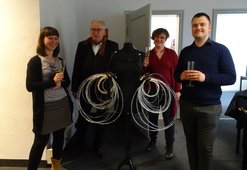
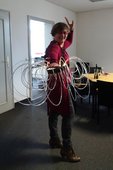
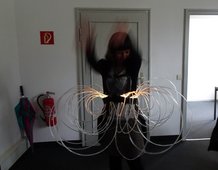
Pavel Karpashevich defended his master theses on 'Digitization of Human Body Abstraction in Theatrical and Dance Performances' succesfully - if we haven't missed anything, then he's the second of our HCI master students to graduate. He was co-supervised by Prof. Wolfgang Sattler from Produktdesign at BUW. Pavel engaged with Schlemmer's Triadic Ballet, investigated the experiences of dance and theater professionals involved in contemporary re-staging of the Triadic Ballet with the costumes, and developed a modern re-interpretation of one costume, picking the wire costume (Reifentänzerin). While trying to stay close to the original, he picked modern materials and technologies (fibre optics cables for the rings and accelerometers for interactive control) that extend the original. After the defense, naturally, everyone wanted to try it out... (we hope to meet Pavel in the future, as he is continuing for a PhD in Sweden)
Paper on our interactive theatre student project 'Dusk' accepted for CHI as a case study
We have written up our experiences from the student project on interactive theatre from 2015 (run by Tobias and Michaela with Eva) where we developed and performed a 20 minute piece called 'Dusk' based on a short story by Saki and submitted it in the category of 'case study' to CHI 2017. Extremely happy that it was accepted!
Mermaid Ballet Interactive Costumes exhibited/performed (Jan/Feb 2017)

The interactive costumes our student project developed for the Children & Youth Ballet of Gera/Altenburg have been successfully presented. They are intended for a ballet show of the 'Little Mermaid'.
First, the ballet dancers performed a short snippet of the ballet with our costumes at the 10 Year anniversary show of the Children & Youth Ballet in the town of Gera on 30.1. and 1.2.2017. Then, the costumes were exhibited at the Winter-Werkschau, an end-of year show organized entirely by the students from the Arts & Design faculty on the last days of term. As our project is interdisciplinary, our A&D student members submitted to exhibit. On the opening night and party, the idea of actually wearing the costumes (instead of just having them on the mannequins) was a big success and lots of fun!
26.Januar 2017 - Alex Wiethoff from LMU Munich visiting
today, Dr. Alex Wiethoff from LMU Munich is visiting us to discuss with Tobias' student project about media-architecture, how to evaluate public installations etc. Alex and Tobias gave presentations in the morning, and in the afternoon, the students present and discuss about their work in the project. A busy but productive day! Thanks for visiting us, Alex!
CHI Papers and Programme Committees 2017
Yeah! We are involved in 2 full papers accepted at CHI 2017! We will present a paper based on Hasibullah Sahibzada's Master theses on 'Designing interactive advertisements for public displays'. And a paper by Katta Spiel, former BUW Master student and now PhD student in Vienna (and co-co-supervised by Eva) was accepted 'When Empathy Is Not Enough: Assessing the Experiences of Autistic Children with Technologies.'
Eva is also busy on the reverse side, on the Program Committees for ACM DIS'17 (Designing Interactive Systems) and C&C'17 (Creativity and Cognition).
Wisp-Festival Leipzig 2016: exhibition of interactive costumes
We exhibited the interactive costumes from last semester's student project Exploring/Self-made textile Sensors at the Wisp-Festival in Leipzig, 18-20 September 2016. Michaela and Aline spent the entire 3 days there, setting up and taking care of everything - thanks to Aline! The HCI team and a few of our students also went to the festival for one day, taking in lots of interactive installations and a few of the evening concerts - fun was had!
(Featured projects: Kinect-Performance Installation, Eyesect, Interspace, lighted pouch workshop)
Trevor Hogan defended his PhD (doctorate) 18 Nov. 2016 !
Trevor Hogan, our external group member and PhD student, successfully defended his PhD about 'Data and Dasein - A Phenomenology of Human-Data Relations". His external examiner (Zweitgutachter) was Prof. Dag Svanaes from the University of Trondheim, Norway.
After a lot of work and an example of a very productive long-distance collaboration (Trevor lives and works in Ireland, where he is a lecturer at the Cork Institute of Technology) this deserves lots of congratulations! Photos show the start of the talk and the celebrations afterwards, including the doctorate hat hand-over.
Dag also gave a talk on Nov 17th for the Bauhaus.Interaction Kolloquium.
Yeah! Full paper on student research project accepted at MUM'16
Our full paper based on the student project 'Understanding Users and Use Contexts' from summer semester 2015 was accepted for publication at Mobile & Ubiquitous Multimedia 2016. Three students engaged in participant observation and interview research to understand player experiences of the mobile pervasive game INGRESS. Our paper focuses on the relation between everyday life and game play and between 'real' world and game world. Master student Pavel will present this work in December in Rovaniemi, Finland.
13.10.2016: Presentation and showcase at SmartTex-Workshop in Weimar
The SmartTex Network runs a number of events to bring together industry and research in smart textiles, which has been really useful for us to get in contact with companies developing interesting material to experiment with in our research. This time, we had the chance to present our own work. Michaela Honauer gave a presentation related to her PhD work, titled 'Robustheit, Waschbarkeit, Bedienbarkeit & Co - Inwieweit sind die Requirements interaktiver Kostüme auf andere Anwendungsfelder übertragbar?' (robusness, washability, usability & co - in how far can the requirements for interactive costumes be transferred to other application areas?'
We further showcased the results of our last student research project, 3 interactive dance costumes for ballet and modern dance and the initial material experiments for textile sensor
Honourable Mention for full paper at Mensch&Computer 2016
Surprise - we received an honourable mention (meaning, we were the runner-up to the best paper award) for 'Can't touch this - The design case study of a museum installation' which reports on Michael Pannier's Master theses, jointly written with Prof. Sven Bertel.
Eva and Susanne (ELIXIER project) attended the conference, as well as Prof. Bertel, and one of the HCI Master students was a student volunteer for M&C. We've come back with a lot of Printen (the local delicacy, a kind of Lebkuchen cake available all year through…).
Our first HCI Master theses defense
Hasibullah Sahibzada defended his Master theses on August 2nd, supervised by Professors Eva Hornecker and Florian Echtler on 'Comparison of Interactive and Non-interactive Advertisement on Public Displays'. Hasibullah is the first HCI Master student to graduate, and has done a lot of classes and research projects with our group, so we are both happy to see him graduate and sad to have him leave. All the best luck for the future!
(in the picture: Eva, Florian, Hasibullah, Tobias, Michaela)
Bauhaus-Interaction Talk Yvonne Rogers
For our last colloquium talk this semester we were excited to have Prof. Yvonne Rogers from UCL, UK visiting us. She is one of the co-authors of an important HCI / Interaction Design textbook and has been pushing the 'Ubiquitous Computing in the Wild' research agenda at a time when UbiComp was still confined to indoor scenarios, as well as collaborating interdisciplinary across disciplines throughout her career. The topic of her talk was "Do We Need Discipline?" where she addressed challenges and chances of interdisciplinary research and design projects. She completed her presentation with interesting project examples.
Publishing and Chairing/Reviewing...
It's starting to be a good year for publications! A journal paper by our external PhD student Trevor Hogan (in collaboration with Uta Hinrichs from the University of St. Andrews) was accepted in the days before Christmas (Hogan, Hinrichs, Hornecker. The Elicitation Interview Technique: Capturing People’s Experiences of Data Representations. IEEE Transactions on Visualization and Computer Graphics, in press) and Eva had a ToCHI article accepted which wraps up on work conducted over the past years (E. Hornecker. The To-and-Fro of Sense Making: Supporting Users'Active Indexing in Museums. ACM Transactions on Computer-Human Interaction ToCHI. accepted for publication).
Publishing papers means taking on duties for the research community in return, so Eva will be busy as an Associate Chair for ACM DIS 2016 and will be on the Program Committee for ACM UbiComp 2016 (which, rather conveniently, takes place in Heidelberg this time).
well represented at TEI'16
We'll be well represented at TEI'16 again, presenting a paper about Lynn Hoff's bachelor theses on the (lack of) influence of kinaesthetic priming on the occurrance of legacy bias gestures in gesture elicitation studies, and our shared work with Kristian Gohlke (Faculty of Design) on 'Pneumatibles' - soft-robotic buttons with tactile feedback. Moreover our external PhD student Trevor Hogan organizes a studio-workshop on 'Tangible Data, Explorations in Data Physicalization'. Lynn will be a student volunteer and get to see the conference backstage activities.
Eva Hornecker gave a keynote at the French HCI Conference IHM 2015 in Toulouse in late October 2015, titled "Sociality and User Engagement in Tangible, Embedded and Embodied Interactions in Public Spaces", presenting her and her group's work in urban space and museum installations and social encounters. It's the 'keynote de clôture'
City Vision Jena festival (October 2015)
The project "Urban Interfaces" exhibited their interactive architectural installation in Jena. "Sonnengarten" and "Light Walk" were selected by Zeiss eG for their exhibition in the Sonnenhof, Jena, during the City Vision Jena festival from 7-11.10.2015. The festival reflected on the topics of 'in/visible cities' and the international year of light.
Sonnengarten was developed by Medieninformatik student Till Fastnacht as part of his bachelor theses in collaboration with Media Architects Johannes Marschall and Abraham Ornelas Aispuro. Light Walk was developed by two Media Architecture students and received assistance from our HCI Master student Hasibullah Sahibzada.
HCI Barbecue 2015 - shared party with Usability and Mobile Media
We continued our new tradition of a yearly barbecue on Sept. 21st, this time as a shared event with the Professorships of Usability (Prof. Sven Bertel) and Mobile Media (Prof. Florian Echtler). We arranged for it to take place at the Künstlergarten, an alternative venue in mid-Weimar which catered for drinks. Despite it being late September, the heavens were nice to us and we had a great evening with chit-chat and beer and lots of, naturally, Thuringia sausages… (Photos: Florian Echtler)
Keynote at Workshop at Mensch und Computer 2015 in Stuttgart
Eva gave the keynote at the annual workshop of the Fachgruppe Be-Greifbare Interkation (the German SIG on tangible interaction) on Sept. 6th with a presentation on 'Wie wirkt sich die Repräsentationsmodalität auf die User Experience multisensorischer Datenrepräsentationen aus? - How Does Representational Modality Influence the User Experience of Multisensory Data Representations?'.
Summaery 2015 is up! Open Lab Night at B11
We are presenting 2 student projects (Interactive Theatre 'Dusk' from last semester, and one of the current projects 'Instrumentation of Public Space for Social Interaction') as well as a Bachelor thesis project.
11.5. Amanda Parkes @»bauhausinteraction.colloquium«
As part of the interdisciplinary series of talks »bauhausinteraction.colloquium" at the Bauhaus-Universität Weimar, we welcome Amanda Parkes for a talk about »Bodycraft: Designing for the Augmented Body«. [ more ]
Yay - 3 papers accepted for 2 conferences
We've been pretty successful with our submissions lately - we'll be presenting two papers at PerDis (6 pages + references), held in Saarbrücken this year, and another 10 page full paper at Creativity&Cognition 2015 in Glasgow.
Both PerDis papers report on student projects, one of them being our collaboration with the media architecture program at BUW, to create an interactive facade mapping for the city of Meiningen "Castle-sized Interfaces for Crowds", the other on sun-light Parasitic Interfaces for public spaces. The C&C paper reports on Michaela Honauer's PhD work about Interactive Costumes for the Theatre Stage, and incorporates insights from the Interactive Costumes student project.
Interactive Theatre Performance
The title of our student project in winter term 2014/15 was "Exploring Interactive Theatre". For this, we created a theatre piece based on the short story "Dusk" by Saki. We developed the script, designed and implemented different interactive features belonging from interactive stage projections over interactive props to wearables. After rehearsing one week intensively with three actors, we successfully staged our current project on March, 10th & 11th, and had more than 100 visitors on both days. This practice-based research enabled us to do indirect observations and interviews on how actors adopt interactive technologies, and to hand out questionnaires to the audience for investigating how spectators perceived our interactive features. For more information, please visit our project blog!
Weimar presence at Lichtcampus 2015 in Hamburg
Our collaborators Anke von der Heide (Berlin, Meiningen Facade-Mapping project) and Johann Gielen (Hamburg/Illmenau, Light Parasites project) attended the Lichtcampus 2015 in Hamburg (15-19.2.2015) where they represented BUW for us, and took some of our project students along.
Johann and Anke held a presentation about our shared work on Monday 16.2. in a track where University teaching staff present projects related to light and discuss the role of light in teaching. Bachelor students Daniel Pollack and Till Fastnacht presented on Wednesday 18.2 in a session dedicated to student presentations. They all came back very excited, having met lots of interest (including invitations to showcase the projects, not all of which will be feasible…)
Michael Pannier Master defense: Touchless Interaction Museum Installation
On February 16th, Michael Pannier passed his Master theses defense. He developed a novel interaction prototype where museum visitors are tracked with a motion sensor (ASUS XtionPRO) and analyzed via the OpenNI framework. A visitor can simply point at the artefacts within a showcase and the software will provide corresponding information on a screen. The system has been running now for around 6 months continously at the museum of pre- and early history Thuringia (Museum für Ur- und Frühgeschichte Thüringens), that we collaborated with to create novel interpretation facilities for the 'Prinzessin von Haßleben' showcase - the grave of a germanic princess.
His project is listed on our page for research projects with further details. We wish Michael all the best for the future!
Talk Max Wolf
On January 26th 2015, Max Wolf gave the final talk in winter term 2014/15 for the Bauhausinteraction Colloquium an interdisciplinary colloquium series at the Bauhaus-Universität Weimar which addresses issues between technology and arts+design and the humanities.
For over fifteen years now Max Wolf together is responsible for the conceptual, creative and technical planning of the international projects of MESO. This is a company that specializes in the creation of site-specific media installations, utilizing state of the art technology: Interactive environments and exhibits for trade shows or museum exhibitions and media systems for contemporary architecture. MESO also often work on fine art projects and a number of members of the company are active in academic education. Max was also involved in the early evolution of the VVVV multipurpose toolkit, which originated at MESO. In his talk Max explained us the idea behind scalability. He gave various examples and showed how effective this approach can be.
C&C and PerDis 2015 Programm Committees
Eva is on the Program Committee of the Creativity & Cognition Conference, which will take place in Glasgow, June 22-25. And Tobias is on the Programm Committe for the PerDis (Pervasive Displays) Conference 2015 in Saarbrücken, June 10-12.
Both conferences still have upcoming deadlines for demos, posters, videos, artwork, workshops etc.
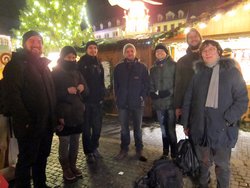
Advent Advent… X-mas time
We went to the Weimar 'Weihnachtsmarkt' with the group and all our tutors, and had a nice evening with Glühwein, Thüringer sausages, and other food. The Weimar market is really nice - oldfashioned-styled and very cozy. And, especially closer to Christmas, you end up bumping into a lot of other acquaintances as well.
We also had a Christmas party with our student project in the lab. One of the German students suggested doing a 'secret santa' game (we had to throw dice to be allowed to pick an unknown package from the table), which was great fun!
Talk Martin Kaltenbrunner
On December 8th 2014, Martin Kaltenbrunner gave the third talk in winter term 2014/15 for the Bauhausinteraction Colloquium, our interdisciplinary colloquium series at the Bauhaus-Universität Weimar which addresses issues between technology and arts+design and the humanities.
Martin Kaltenbrunner is Professor at the Interface Culture Lab at the University of Art and Design in Linz. Before his return to Austria he worked as researcher and lecturer at the Pompeu Fabra University in Barcelona, at the MIT Medialab Europe in Dublin and further European universities. As co-founder of Reactable Systems he had been mainly responsible for the interaction design concepts behind the Reactable, a tangible modular synthesizer that has been staged by renowned artists such as Björk. In his talk Martin explained us the idea behind this innovative music instrument and demonstrated its workflow. In the afternoon, he gave a workshop for people that are interested in testing the Reactable.
Exhibition of the Meiningen Mysterious Theatre Machine at the Media Architecture Biennale Marketplace
Anke von der Heide, who collaborated with us on supervising the Meiningen Interactive Facade Mapping project, has exhibited this project at MAB, the Media Architecture Biennale in Aarhus, Denmark (19-22 Nov) at the Marketplace event. We'd have loved to attend MAB as well, but weren't able - thanks to Anke for presenting our shared work!
Talk Jürgen Steimle
On November 19th 2014, Jürgen Steimle gave the second talk in winter term 2014/15 for the Bauhausinteraction Colloquium an interdisciplinary colloquium series at the Bauhaus-Universität Weimar which addresses issues between technology and arts+design and the humanities.
Dr. Jürgen Steimle is head of the Embodied Interaction Group at the Max Planck Institute for Informatics and Saarland University. Previously he was a Visiting Assistant Professor at the MIT Media Lab. His research focuses on future forms of Human-Computer Interaction, including interaction with flexible displays, printed sensors, on-body interfaces, paper-based interaction and interactive surfaces. In his talk Jürgen explained us the printable display technology he and his research team have developed. Furthermore he showed with several examples how this flexible materialization could enhance future scenarios.
Talk Caroline Hummels
On November 3rd 2014, Caroline Hummels gave the opening talk in winter term 2014/15 for the Bauhausinteraction Colloquium an interdisciplinary colloquium series at the Bauhaus-Universität Weimar which addresses issues between technology and arts+design and the humanities.
Dr. Caroline Hummels has a background in Industrial Design Engineering, is full professor Design & Theory for Transformative Qualities at the department of Industrial Design (ID) and heading the Designing Quality in Interaction group at the Eindhoven University of Technology. Her activities concentrate on developing frameworks, tools and concepts to support designing towards transformation. In her talk Caroline explained us what is “Participartory Sensemaking” and how design changed since the industrialization. In addition, she showed us great examples from her own teaching and research projects.
HCI Group Campus Thüringen Tour 2014 :)
Unser Workshop zur Campus Thüringen Tour, bei dem Schülerinnen der 10.-13. Klasse eigene Controller für Onlinespiele entwickelt haben, war ein voller Erfolg. Mit 16 Mädels in acht Teams gab es kreative Ergebnisse & spannende Spielmomente. Das Ganze haben wir mit MaKey MaKey realisiert, einem Toolkit, mit dem fast beliebige Objekte (Banane, Knetmasse) zum Tastaturersatz werden können.
Our workshop for the Campus Thüringen Tour was successful. Schoolgirls between 10th-13th class level developed own controllers for online games. We had creative results & exciting gaming moments with the 16 girls in 8 teams. We have realized the projects with MaKey MaKey which connects a computer to any conductive object (e.g. clay or bananas) & turns it into an input device.
HCI Group with Interactive Costume student project at the Wear IT Festival in Berlin
We will be exhibiting the 'Interactive Costumes' student project at the wearIT festival for wearable electronics and arts in Berlin, 11-12 October at Betahaus Berlin.
Our interdisciplinary student team will present the costumes built over the past semester, based on Jules Verne's story '20.000 leagues under the sea' (Captain Nemo), for Captain Nemo, the Diving Suit of the Nautilus Crew, and an Octopus Sea Creature.
Successful Interactive Facade Mapping Event in Meiningen
The interactive facade mapping "Georg II - The mysteriouse theatre machine" was shown on the 22. and 23. August in Meiningen. Finally the overall experience included reactive, autoactive, performative and interactive elements in one composition. Visitors were received with a reactive ceiling projection triggering a wave in a cosmos of particles that filled slowly the facade while people were waiting for the start. On a unique semicircle facade an abstract interpretation of the twelve principles of meiningen theatre was shown then, revealing also that the castle behind its wall is a giant machine driving theatre.
Physical principles were brought into the yard where the theatre machine was excavated and placed into the machines sockets to activate the machine. People then were able to arrange the stage design based on the sketches of Georg II.
> more... > Webpage > Trailer > Outcome > Outcome (full length video)
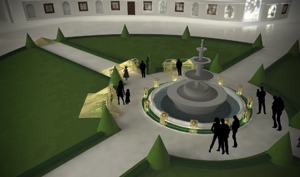
Our interactive facade mapping 'Georg II - the mysterious theatre machine' will be shown on 22nd and 23rd of August in the city of Meiningen, in Elisabethenburg castle.
Duke Georg II is considered as the developer of twelve main principles that govern modern theatre, and the festival celebrates his legacy on occasion of his death day. Together with the Professorship Darstellungsmethodik in Architecture we have worked with a mixed group of MediaArchitecture and Computer Science & Media students to develop this interactive spectacle in collaboration with the city of Meiningen.
School pupils will be discovering the twelve principles throughout the city and bring these to the courtyard of the castle, activating Georg's mysterious "re-discovered" theatre machine. The show is structured in an reactive part, the autocative mapping itself and the interactive part at the end.
> mehr ...
Summaery 2014 - Open Lab Night der MedienInformatik 11+12 July
We've exhibited our student projects again as part of the Open Lab Night of the Computer Science & Media group within the context of the University's end of year show. Both of our large student projects exhibited, as well as Michael Pannier, our master student, who also gave a 1 minute presentation as part of the 'elevator talks' held in the foyer.
The weather could've been a bit better, but we nevertheless had a good party, including the barbecue - nothing deters Thuringian's from their barby!
Keynote at the Crossworlds Conference in Chemnitz and talk in Dresden
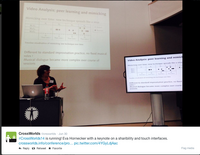
Prof. Eva Hornecker gave a keynote presentation about "Shared interactions beyond the desktop: how new interface types can support sociable user experiences" on June 30th at the 'Crossworlds - Theory, Development & Evaluation of Social Technology' International Conference in Chemnitz. The conference is organized by the TU Chemnitz PhD graduate school Crossworlds, which has the theme of “Connecting Virtual and Real Social Worlds”.
Moreover, on June 27th Eva Hornecker presented in the Dresden Talks on Interaction & Visualization at TU Dresden about 'Physical-Digital-Social Encounters: Exploring the Social Design Space of Physical Computing' and visited Prof. Raimund Dachselt's research group.
Talk Marc Hassenzahl
On June 25th 2014, Marc Hassenzahl gave the concluding talk in summer term 2014 for the Bauhausinteraction Colloquium a new interdisciplinary colloquium series at the Bauhaus-Universität Weimar which addresses issues between technology and arts+design and the humanities.
Dr. Marc Hassenzahl is a Professor and head of the “Experience Design“ group at the Folkwang University of Arts in Essen, Germany. His research interests revolve around the positive aspects of interactive products, their beauty and the question of how to design for positive experiences. In 2010 he published the book “Experience Design: Technology for All the Right Reasons” (Morgan & Claypool Publishers). He explained us what "experience design" is and what are "troublemakers" or "problemsolvers". Additionally, he showed a lot of interesting examples that may change the audience's perspective.
Ramirez visits
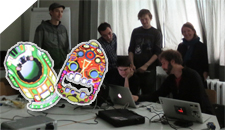
Jaime Ramirez came over from Heidelberg to teach the MediaArchitecture students a few tricks about facade mapping and production processes.
Talk Norbert Schnell
On June 2nd 2014, Norbert Schnell was our guest for the Bauhausinteraction Colloquium a new interdisciplinary colloquium series at the Bauhaus-Universität Weimar which addresses issues between technology and arts+design and the humanities.
Dr. Norbert Schnell is a researcher and developer focusing on real-time interactive digital audio processing and interaction design. He was involved in numerous international research and development projects as well as artistic works in the field of music, interactive audiovisual installations, music pedagogy, and industrial design. During the talk, he offered us insights into his work. In addition, he showed a web-based live-demo that gave us the chance to experience one project example immediately on our smart phones.
Talk Georg Trogemann
On May 12th 2014, Georg Trogemann was our guest for the Bauhausinteraction Colloquium a new interdisciplinary colloquium series at the Bauhaus-Universität Weimar which addresses issues between technology and arts+design and the humanities.
Prof. Dr. Georg Trogemann is the leader of lab3 at the Academy of Media Arts Cologne. Since 1994 he is full professor for Experimental Informatics at the Academy of Media Arts Cologne and author of the book CodeArt (2005). His current research interests include theories of artifacts, culture & technology, and the entanglement of code and material - and this was exactly the topic he fascinated his audience with! On the basis of several interesting example, he showed us in detail how he explores code and material.
Workshop + Talk Nic Marquardt
On April 28th 2014, Nicolai Marquardt was our second guest for the Bauhausinteraction Colloquium, a new interdisciplinary colloquium series at the Bauhaus-Universität Weimar which addresses issues between technology and arts+design and the humanities.
Nic Marquardt is an Assistant Professor in Physical Computing at the University College London. After graduating from the Media Systems program at the Bauhaus-University Weimar, he did his PhD at the University of Calgary, Canada. He works on physical computing, digital fabrication, ubiquitous computing, and proxemic interactions. One of his passions are sketching and prototyping strategies, he is a co-author of the ‘Sketching User Experiences Workbook’ with Saul Greenberg, Sheelagh Carpendale, and Bill Buxton.
Additionally, Nic offered the 2-hour workshop "Design Sketching" in the early afternoon. Students of different disciplines, from Informatics, Media Arts and Product Design, came to learn essential sketching strategies or shortcuts and to hear about the various ways of using sketches as a powerful tool when designing for novel user experiences.
A full paper about last semester's student project on kick/flickable interfaces was accepted for the 3rd International Symposium on Pervasive Displays (in Copenhagen). The symposium focuses on the opportunities and challenges raised by the emergence of pervasive display systems as a new communication medium for public and semi-public spaces.
Our paper is titled 'Movable, Kick-/Flickable Light Fragments Eliciting Ad-hoc Interaction in Public Space' - we've been struggling to come up with a good name for the kick/flickable thingies… :)
Talk Kia Höök
On April 14th 2014, Kia Höök was our first guest for the Bauhausinteraction Colloquium a new interdisciplinary colloquium series at the Bauhaus-Universität Weimar which addresses issues between technology and arts+design and the humanities.
Kristina Höök is known for her work on social navigation, seamfulness, mobile services, affective interaction and lately, designing for bodily engagement in interaction. She is a Professor in Interaction Design at the Royal Institute of Technology, Stockholm. She started and currently leads the Mobile Life centre, is listed as one of Sweden’s 50 most influential IT-women of the year – consecutively since 2008, and is a member of the Royal Swedish Academy of Engineering Sciences.
Girls Day 2014 :)
Der Workshop 'Unsichtbare Computer' zum Girls' Day, bei dem die Schulmädchen zwischen 12 und 15 Jahren eigene Controller für Onlinespiele entwickelt haben, war ein voller Erfolg. Mit neun Mädels in vier Teams gab es kreative Ergebnisse & spannende Spielmomente. Das Ganze haben wir mit MaKey MaKey realisiert, einem Toolkit, mit dem fast beliebige Objekte (Banane, Knetmasse) zum Tastaturersatz werden können. Mehr Bilder hier
The workshop 'invisible computers' for the Girls' Day was successful. Schoolgirls between 12 and 15 years developed own controllers for online games. We had creative results & exciting gaming moments with the nine girls in four teams. We have realized the projects with MaKey MaKey which connects a computer to any conductive object (e.g. clay or bananas) & turns it into an input device. For more photos see here
The Weimar HCI group at TEI'14 in Munich
TEI was a blast again! Maxed out on Bavarian food, good talks, lots of demos, our own poster presentation, and met a lot of our colleagues from around the world again. Tobias and Michaela were helping out as student volunteers, but still managed to see most of the program. Loraine, our affiliated lab member was also attending, giving us all a chance to catch up. We also visited the organizers at LMU the next day for some more discussion.
Interactive Facademapping
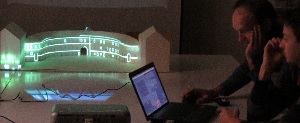
In collaboration with the Mediaarchitecture Masters and Anke von der Heide students developed three interactive concepts for the facade mapping in Meiningen, which will receive its premiere in August 2014. The best concept will win an opportunity to showcase the project on the historic castle in very unique 5 projector wide and half circle setup. Final presentations will be on the 13th of February.
We will all be attending TEI in Munich. Michaela and Tobias will be student volunteers, and we are presenting a poster in the Work-in-Progress track, and generally, catching up with the TEI community folks! We also look forward to see Loraine again, who will be coming over to TEI from Glasgow.
Mensch und Computer Madness 2013
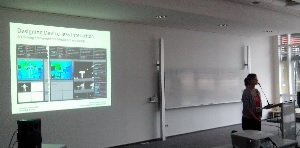
This year our HCI group is celebrating the "Madness" in Bremen University which is hosting the Mensch & Computer. We are presenting two posters and an interactive demo. Additionally Eva Hornecker is presenting a guest lecture for the "Be-greifbare Interaktion" workshop about "All that Talk about Physical Affordances to be Considered Harmful".
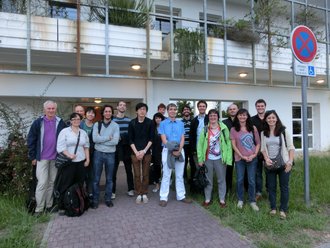
Prof. Hornecker was an invited keynote speaker for the first collaborative French-German event on Tangible Interaction, 25-30 August in France, a summerschool for master and PhD level students, as well as post-doctoral researchers. Other keynote speakers included Professors Michel Beaudoin-Lafon (France), Emmanuel Dubois (France), Martin Kaltenbrunner, who showcased the Reactable (Austria), and Alan Dix (UK), with additional presentations made by participating students and researchers. The summerschool was hosted by ESTIA in Bidart, in the lovely Basque region of France at the Altantic coast. The event was organized by Prof. Nadine Couture (ESTIA) in collaboration with Prof. Jens Geelhaar from BUW.
Summaery 2013
Summaery-in-Progress Report about student project >Kick-Flickable Interfaces< (in German)
Our student project was selected as one of the spotlight projects in the BUW 'Summaery-in-progress' series, which over the course of several weeks reports on seven projects across the University ahead of the summaery event. The report is only available in German, but has some nice pictures with it.
Urban HCI Workshop

Am 29. Juni 2013 fand ein Workshop zum Thema "Urban HCI: Interactive Media Architecture and Disproportionate Scale" im Forschungslabor der HCI Gruppe statt. In Kollaboration mit Studenten des Medienarchitekturstudiengangs wurden konkrete Fallstudien bearbeitet, welche unterschiedliche Typen der Interaktion in Relation zum Stadtraum betrachten.
Conference Committees, Committes
Eva Hornecker is an (AC) Associate Chair for CHI 2014 on the 'Understanding People: Theory, Concepts, Methods' subcommittee panel. She also serves as Poster Chair for ITS 2013 in St. Andrews, the 'Interactive Tabletops and Surfaces' conference, and is on the Technical Program Committee for TEI'14, the Tangible, Embedded and Embodied Interaction Conference






